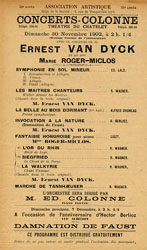
![]()
Conductors: Édouard Colonne (1838-1910)
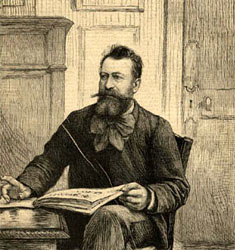
 |
Conductors: Édouard Colonne (1838-1910)
|
 |
Introduction
Beginnings
Emergence
Recognition
Repertoire
Colonne as a Berlioz conductor
Epilogue
Table of performances
Introduction
Table
Illustrations
This page is also available in French
Copyright notice: The texts, photos, images and musical scores on all pages of this site are covered by UK Law and International Law. All rights of publication or reproduction of this material in any form, including Web page use, are reserved. Their use without our explicit permission is illegal.
![]()
Judas Colonna, known as Édouard Colonne (1838-1910), the founder of the concert society to which he gave his name and which survived him, was the most active and influential champion of Berlioz in his time, and probably conducted more performances of Berlioz than any other conductor until Colin Davis. Because of the length of his career and the abundance of the available material, the subject has been divided into three related pages: the present page, which provides a general introduction and also comprises a chronological table of performances and a series of illustrations; then two pages of texts, the first of which reproduces a large number of concert announcements and reviews of performances in the original French, while the second presents a number of texts apart from the announcements and reviews (see in addition the two autograph letters, of Édouard Alexandre and of Colonne himself). There is also a separate page on the conductor Charles Lamoureux, a contemporary of Colonne’s and the founder of a rival concert society in Paris; though Lamoureux and his successor Camille Chevillard were not by any means special champions of Berlioz, their inclusion is intended to provide some of the wider context in which Colonne worked and a contrast to Colonne himself. The same applies to the page on the Conservatoire and Berlioz, which covers this same period. It goes without saying that the pages on Colonne concentrate on what he did for Berlioz specifically, not on his (considerable) achievements as a conductor in general. Although Colonne quickly developed the reputation of being a leading champion of Berlioz, his concert repertoire was vast and ranged from the classics to contemporary music from all the leading musical nations of the time.
An outline of Colonne’s career and achievement is given by the writer and critic Romain Rolland (written in 1908), and also by the obituary notice published in Le Ménestrel (2 April 1910). Born in Bordeaux on 23 July 1838 — coincidentally Lamoureux was also born there — Colonne came to Paris in 1855 and entered the Conservatoire two years later, where he studied violin and harmony, in which subjects he won prizes; he played in the orchestra of the Opéra and also as second violin in a quartet that was led by Lamoureux. He also played at one time in Pasdeloup’s orchestra, and like Lamoureux recognised later his debt to the pioneering venture of the older man, whose example inspired both of them. One of the unknowns of Colonne’s early career is what contacts if any he had with Berlioz — Colonne’s name is nowhere mentioned in Berlioz’s extant correspondence or any of his writings. Colonne must have had opportunities to see if not meet Berlioz and to hear his music (he could for instance have attended some of the performances of Les Troyens à Carthage in late 1863), but there does not appear to be any concrete evidence. It is noticeable that when later (in 1875) Colonne started to attempt larger works by Berlioz he turned initially for advice to Ernest Reyer, a close friend of the composer.
It was only after 1871 that Colonne’s real career began; the humiliation of France by Prussia in the war of 1870-71 provided a stimulus and a context for the revival of French musical life. With the support of the publisher Hartmann and a group of young French composers, Colonne recruited an orchestra and founded a concert society, the Concert national, which gave its first concert at the Odéon theatre on 2 March 1873. On the 9th of November of the same year the society moved its venue to the much larger Châtelet theatre (it had a seating capacity of no less than 3,600) where it remained throughout Colonne’s career and beyond (by contrast Lamoureux’s concert society, founded in 1881, did not have a single fixed venue). Because of financial constraints the society did not last beyond the end of the 1873-74 season (its last concert was on 22 March 1874), and was forced to reconstitute itself on its own under the new and this time permanent title of the Association artistique, often referred to simply as the Concerts Colonne (for its full title see for example the announcement of 4 September 1909). In its new guise and after some initial delay the society eventually started its first season on 15 November 1874.
During the early stages of Colonne’s enterprise it was not obvious that he was destined to become the foremost champion of Berlioz of his time in France and abroad, nor did he create by himself the Berlioz revival of the 1870s which had in fact started to develop before him. In 1873 and 1874 more Berlioz was being performed elsewhere in Paris than at Colonne’s concerts. Colonne at this time was only performing shorter pieces of Berlioz, though it is noticeable that they were pieces that Pasdeloup had not performed, as though Colonne wanted at the outset to show his distinctiveness. In 1875 he took the first significant move, by deciding to break new ground and to give complete performances, first of l’Enfance du Christ (not in fact quite complete) then of Roméo et Juliette (complete), which had not happened in Paris since Berlioz’s lifetime. The results were not as yet conclusive. Ernest Reyer, who had known Berlioz well and had been consulted by Colonne, was very guarded in his reaction to the performance of l’Enfance and openly apprehensive for the projected Roméo, but after the performance of the latter he was much more positive. But the general public still needed to be won over. No major works of Berlioz were performed by Colonne in 1876, while in the meantime Pasdeloup performed Harold en Italie complete and gave another complete Symphonie fantastique, works which Colonne did not attempt for the moment. The rivalry between the two conductors was developing, with Berlioz as a battleground. In the meantime la Damnation de Faust had been growing steadily in popularity, and excerpts were being increasingly performed with success, with the first two parts complete at the Conservatoire (13 February 1876). Pasdeloup followed the example almost exactly a year later (11 February 1877) and scheduled a complete performance for the following week. Hitherto Colonne had only played short orchestral excerpts from the work (the Valse des Sylphes 3 times in 1873 and 1876, the Marche hongroise twice in 1876), but he had the vision, and perhaps the good fortune, to sense the growing popularity of the work and to schedule a complete performance at exactly the same time as Pasdeloup, on 18 February 1877: this was the turning point. In Colonne’s hands the work scored a sensational success and started on its triumphant career in Paris, in France and abroad. Such was the public enthusiasm that Colonne had to give 6 consecutive performances in February and March 1877, and thereafter not one season passed without at least one and usually several performances of the work by the Concerts Colonne. Other conductors (Pasdeloup, later Lamoureux) also put on the work at intervals, but it was Colonne who was identified with it and over his career he probably gave more performances of la Damnation than any other conductor since (for a discussion of the figures see below; see also the document on Colonne on a separate page of this site). The public never seemed to tire of hearing the work, though some critics occasionally did (see for example the reviews of 24 December 1893, 6 May 1894 and especially 20 December 1896), and from time to time Le Ménestrel warned its readers that it would not review every single performance of the work (for example 12 January 1902).
Colonne’s success with la Damnation in February and March 1877 established him at a stroke as the most popular conductor of the day, and the most persuasive advocate of the music of Berlioz, to which the public now became more receptive than ever. Colonne will have been pleased with the unanimously favourable reaction of the press, but most particularly by the endorsement of two old friends of the composer who had known him well, Auguste Morel who described Colonne as ‘an ardent admirer and a devoted champion of the music of Berlioz’ (see Le Ménestrel 25 February, 4 March and 11 March 1877), and Ernest Reyer who after his initial doubts was now thoroughly won over (Journal des Débats, 13 March 1877). The icing on the cake will have been the public gift by one of the testamentary executors of Berlioz, his old friend the instrument-maker Édouard Alexandre, of one of the batons that he had himself inherited from Berlioz. His letter to Colonne announcing the gift is extant; it is now in the Hector Berlioz Museum to which we are indebted for permission to reproduce it on this site for the first time, together with a transcription and a translation (by Michel Austin). This symbolic recognition of Colonne’s new status came as a direct consequence of the triumphant performances of la Damnation: Alexandre’s letter to Colonne is dated 20 May 1877, and the gift was reported not long after in Le Ménestrel. Within less than a year a critic could write that at the Châtelet Berlioz was now ‘in conquered territory’ and suggested that Colonne was going to enjoy ‘the honour of being the Habeneck of the French Beethoven’. Early in 1880 Colonne’s achievements were recognised by the state with the conferment of the Légion d’honneur (Le Ménestrel 22 February 1880). Twenty years later, in 1900, Colonne was promoted to the rank of Officer of the Légion d’honneur, the first conductor to receive the honour, though he modestly refused to claim any greater achievement than that of having survived his two older colleagues Pasdeloup and Lamoureux, to whom he paid tribute. The now ageing Ernest Reyer attended the ceremony and in his speech linked the names of Berlioz and Colonne (see the reports in Le Ménestrel of 21 October & 4 November 1900).
One mark of approbation which will have greatly impressed Colonne was that from Hans von Bülow, the most demanding of critics, who claimed a personal connection with Berlioz dating back to the 1850s, at a time when Colonne was still only a student. In 1882 Bülow wrote to Colonne to offer his own contribution to the subscription for the Berlioz monument in Paris and acknowledged his work on behalf of Berlioz ‘your great compatriot whose noble champion you have instituted yourself’. A few years later, in 1885, Bülow made his only visit to Paris since the Franco-Prussian war to perform at the Colonne concerts. In a letter to a friend he praised Colonne’s conducting of Berlioz and the quality of his orchestra, which he found even better than his own in Meiningen. To Colonne himself he wrote in the most flattering terms: Colonne’s orchestra was a ‘model orchestra’ and in Colonne Bülow had found ‘a true conductor by the grace of God’.
A glance at the table below shows that throughout Colonne’s conducting career there never was a season in which works of Berlioz were not played; every season included at least one major work, even if at times it was the (inevitable!) Damnation. But within the long span of more than 35 years of active conducting, trends may be identified. There was an initial burst of activity in 1877 in the wake of the spectacular success of la Damnation and this lasted into the early 1880s. In this period, as well as repeating works which had been successful in performance, Colonne was emboldened to widen his repertoire and include large works he had not done before: the Symphonie fantastique (1877), the Requiem (1878), la Prise de Troie in concert form, in emulation of Pasdeloup’s initiative (1879), Lélio, the sequel to the Fantastique, though without a narrator (1881), and the Symphonie funèbre et triomphale (1882). In this period he also introduced into his programmes the idea of a ‘Berlioz Festival’, a concert wholly devoted to the composer which provided an opportunity to present excerpts of already popular works, and also to perform less familiar pieces. He did this first on a small scale in May 1877, following the success of la Damnation, then twice in December 1881, to coincide with the composer’s birthday. Thereafter, commemorative concerts related to the calendar of Berlioz’s life and career recur throughout Colonne’s concerts: there was a memorial concert on 8 March 1885 to mark the anniversary of the composer’s death, a concert on 24 October 1886 to celebrate the inauguration of the statue of Berlioz at Square Vintimille. In 1894-1895 he put on an extended Berlioz Cycle which was surely intended to coincide with the 25th anniversary of the composer’s death (though curiously the announcements and reviews in Le Ménestrel fail to make the connection). In the course of this Cycle Colonne performed again Lélio as a sequel to the Fantastique and also performed the Te Deum which he had not done before. 1896 brought a performance of la Damnation to celebrate the 50th anniversary of the work, and on 11 December 1898 he timed his 100th performance of la Damnation to coincide not only with the composer’s birthday but to make sure it would fit into the framework of the 25th anniversary of the foundation of the Concerts Colonne (the performance is commemorated in a contemporary drawing by Hector Dumas). The celebrations for the centenary in 1903 were perhaps less adventurous than might have been expected, and at least one critic pointed this out (Colonne also took no part in the centenary celebrations at Grenoble during the summer). But there was a compensation in an interesting concert of Berlioz’s songs put on specially by Mme Colonne and her students on 22 December 1903: Mme Colonne, formerly Mlle Eugénie Vergin, was a talented singer who had frequently performed under Colonne from 1875 onwards. Her name turns up on the programme for the performance of la Damnation on 17 November 1878 and in a number of reviews (see for example Ernest Reyer Journal des Débats 12 December 1875, 16 February 1879, cf. 30 January 1881, 11 December 1892). They married in 1886; Mme Colonne went on to found a very successful singing school and was thus able to contribute to the centenary celebrations. As late as 1908, Colonne put on another commemorative concert: the Shakespeare-Berlioz Festival of 8 March not only coincided with the anniversary of the composer’s death, but was inspired by an unfulfilled project of Berlioz himself. Sixty years earlier, while he was in London, Berlioz had planned a Shakespeare concert at Covent Garden, though the plan did not materialise (see the letter CG no. 1185 of 15 March 1848, and the programme reproduced below).
The table below lists all the known performances of works of Berlioz given by Colonne in Paris, the vast majority of them at the Châtelet theatre and in the regular seasons of the Concerts Colonne (from October to April). For reasons explained below the figures should give a representative idea of Colonne’s Berlioz repertoire, but it may contain gaps even for Paris. With this proviso, clear patterns emerge as to the relative popularity (or unpopularity) of different works, though it is difficult to distinguish between Colonne’s personal preferences and those of his public. Colonne, it may be suggested, programmed most frequently those works which he knew from experience would be welcomed by the public. He may not have possessed to the same extent the missionary zeal of Pasdeloup, who was prepared to face down opposition, nor did he quite have the single-mindedness of Lamoureux in the latter’s promotion of the music of Wagner. Among his many talents, musical and other, Colonne was a communicator and conciliator (see the reviews of 28 April 1889, 18 December 1898, 25 March 1906, 19 January 1907), and this was one of the secrets of his long success (see also the document on Colonne of ca. 1891). Lamoureux thought of giving up his concert society altogether in 1897, while Colonne had no difficulty on holding on to his position through to the end. Romain Rolland comments on the remarkably lively atmosphere at Colonne’s concerts, particularly on the part of the younger members of the public, which is also attested otherwise (see for example the review of 19 January 1896). Whenever faced with interruptions or protests from sections of his audience Colonne was never at a loss to defuse the atmosphere with a witty speech (see for one example the review of 12 April 1896).
Of all Berlioz’s major works, la Damnation was by far the most popular, with more than 3 times as many performances (around 157 under Colonne himself) than the next most popular work, the Symphonie fantastique (45). Well behind these were Roméo et Juliette, l’Enfance du Christ and the Requiem, all with about 14 complete performances each (and excerpts from all of them were also popular, including the Dies iræ from the Requiem). This immediately points to the major works that were relatively neglected. While the Requiem established itself in the repertoire, the Te Deum was given only two performances (in 1895), without the concluding March, though a critic had expressed the hope that it would be included (Colonne apparently played the March only once, in 1878). The Symphonie funèbre et triomphale apparently achieved only one complete performance (in 1882), while Harold en Italie received no more than two complete performances (in 1888 and 1900), against four by Pasdeloup, and unlike Pasdeloup and Lamoureux Colonne did not perform individual movements from the work (except for the two concerts of December 1881). Perhaps not surprisingly, Lélio, the sequel to the Symphonie fantastique was performed only 5 times in all (1881 and 1895), and on every occasion Colonne only played the separate movements without risking having a narrator speak the original monologues, which were merely summarised on the programme (see the programme for the performance of 10 February 1895). Among the overtures Benvenuto Cellini and le Carnaval romain were the most popular (about 24 performances each); les Francs-Juges was not far behind (18), and le Roi Lear managed a total of 7 in all. Waverley was never performed, and le Corsaire only twice (in 1874 and 1889), whereas it had been one of Hans von Bülow’s most popular orchestral showpieces (24 performances by him between 1884 and 1888): for some reason it was not highly thought of at the time in Paris. Perhaps most surprising is the total neglect of the overture to Béatrice et Bénédict (it seems to have been played only once in concerts in Paris between 1869 and 1910, by the Concerts Lamoureux under Camille Chevillard in November 1909; see Le Ménestrel 27 November, p. 381 and 4 December, p. 388). Another striking absentee is that of the complete song cycle Les Nuits d’été: only a few separate songs were performed from time to time. Colonne never performed the complete Tristia, only the 2nd and especially the 3rd pieces, usually separately.
But the most striking absentees are the operas. Critics in Paris sometimes deplored, and with good reason, the failure to stage Berlioz’s operas in France, and contrasted this with the success of Wagner (see for example Ernest Reyer in 1895, the reviews of 21 November and 28 November 1897, 11 December 1898, and the page on Berlioz’s operas in France 1869-1914). Colonne here does not compare with his younger contemporary Felix Mottl, the first conductor to have performed on stage every one of Berlioz’s operas. Colonne’s career, it is true, was largely in the concert hall and not at the opera (he conducted at the Opéra for a brief period from 1891 to 1893; there was a project to put him in charge of an opera house in Paris in 1896, with the possibility of performing the complete Les Troyens in two consecutive evenings, but the plan fell through). The only performance of a Berlioz opera he gave on stage in France — les Troyens à Carthage — came late in his career (in 1905, at the Théâtre Antique d’Orange), and seems not to have been particularly successful. It was Lamoureux and not Colonne who conducted the first staged performance of Béatrice et Bénédict in Paris, in 1890. (Colonne admittedly did conduct the first staged performance in Paris of la Damnation de Faust, in 1903: it was thanks to the success of the work in the concert hall that it eventually reached the stage, and thus took the place that should have gone to the real operas of Berlioz; Reyer’s protest of 1895 remains relevant to this day.) But what is striking in Colonne’s repertoire is his apparent failure to explore fully the possibility of concert performances of Berlioz’s operas, or of separate acts from them. He did put on in the concert hall several performances of la Prise de Troie in 1879, but this was clearly a response to the initiative of Pasdeloup and not his own idea, and he did not repeat the complete work subsequently, though he occasionally played excerpts, and apparently conducted a staged performance in Milan in 1899. He performed Act IV of les Troyens à Carthage in 1888, but waited till 1905 to give the (almost complete) work in concert form and this came after the staged performance at Orange. The two most glaring absentees are Benvenuto Cellini and Béatrice and Bénédict, both of which were fairly frequently performed on stage in Germany (the complete Troyens was also staged by Felix Mottl in Karlsruhe, first in 1890 and subsequently elsewhere as well). It should have been possible to attempt these two works in concert form in Paris: performances of entire acts of Wagner operas, sometimes even of complete operas (such as Das Rheingold), were common in the 1880s, 1890s and the early years of the next century, even after Wagner’s operas had reached the stage in Paris. This was true not just at the Lamoureux concerts, but at those of Colonne himself, whose performances of Wagner were almost as numerous as those of Berlioz. With Benvenuto Cellini Colonne performed the overture very frequently, but from the rest of the opera only one aria once in 1880. The duet from Béatrice et Bénédict from the end of Act I was a popular piece in Paris at the time, and frequently performed by Colonne, Lamoureux and others, but the rest of the opera apparently did not attract any interest (Colonne performed the Sicilienne once, in 1890).
Towards the end of his career Colonne made a number of short recordings with his orchestra, including one of the Marche hongroise, one of the pieces he must have conducted several hundred times. Those recordings, though of exceptional interest, have to be assessed in the light of the severe restrictions imposed by the recording techniques of the time, then in their infancy. For example, the Marche hongroise had to be amputated of the entire central development section in order to make the piece fit the maximum duration that recordings could accommodate at the time (under 4 minutes). It would therefore be unjustifiable to reach firm conclusions from this limited evidence. The recorded performances are unfailingly vital and expressive, and notable features are the flexible treatment of tempo, and the use of portamento in string playing. The recordings of Berlioz made many decades later by Pierre Monteux are also indirectly of interest; these include several of the Symphonie fantastique (one of 1952 with the San Francisco Symphony Orchestra), one of Roméo et Juliette and one of a live performance of la Damnation de Faust (both of these date from 1962, with the London Symphony Orchestra). Monteux had a direct link with Colonne: he was for a decade and a half leader of the viola section of the Colonne orchestra and an assistant conductor. His name appears for example on the programme of the performance of la Damnation on 11 December 1898, and Monteux’s playing is praised in a number of reviews. Monteux could thus claim a direct connection with Colonne’s performing traditions. Though his own recorded performances cannot of course be taken as a direct reflection of Colonne’s, they show some of the characteristics that were associated with his mentor. The recorded performances always seek to bring the music to life and convey its character and colour, and in this they can achieve at times great eloquence, though precision of detail and ensemble are at times sacrificed. Monteux’s tempi not infrequently diverge from Berlioz’s own metronome marks (for example his tempo for the Marche hongroise is faster than in the score, but is also faster than that of Colonne’s recorded performance). In general, Monteux is liable to treat tempo in a very flexible way; for example, his acceleration at the end of the last movement of the Symphonie fantastique though exciting is extreme and far beyond anything Berlioz suggested.
There are numerous descriptions of Colonne’s general style of conducting, and of his performances of individual works of Berlioz. In these respects he was often compared and contrasted with his contemporary Charles Lamoureux, to the disadvantage of the latter as far as Berlioz was concerned. Lamoureux was for some tastes too precise and metronomic, even stiff, and according to contemporary views not fully at home in Berlioz, while Colonne communicated much better the spirit and warmth of the music, even if in detail he was less exact (see the material collected in the page on Lamoureux, which will not be repeated here). The record speaks for itself: Colonne was by far the most successful conductor of Berlioz of his day, and did more to promote the composer, and over a longer period of time, than any of his contemporaries. As he rightly claimed in 1903, ‘Without the concert performances, the present generation would know nothing of Beethoven and Berlioz apart from their name’. One illustration of the impact Colonne’s performances of Berlioz had is provided by the writer and musicologist Julien Tiersot: it was by hearing Berlioz performed first by Pasdeloup then by Colonne that Tiersot, himself a product of the revival of the post-1870 period, was inspired to devote a significant part of his career to the study of Berlioz.
As well as the reactions of contemporaries to Colonne’s performances of Berlioz, there is one general statement from Colonne himself in which he outlines his conception of the composer and his approach to his music, the short piece he wrote for the commemorative Livre d’Or du Centenaire in 1903, from which an excerpt has just been quoted. In this statement Colonne stresses the intensity of feeling of Berlioz’s music and the need for the conductor to identify with him: ‘In Berlioz’s works, feelings and passions are expressed with unheard-of intensity. Hence a performance that is merely perfect would not be a truthful performance’. This statement reads like a short echo of Berlioz’s more complex statement in his Memoirs (Post-Scriptum) about the characteristics of his music and how it should be performed. But Colonne then adds: ‘One should not reason with Berlioz, who is not reasonable. He must be admired in his genius and loved even in his errors’, a statement which is at least questionable. Colonne’s statement about Berlioz may be compared with one of Colin Davis which is reproduced on this site: they seem to reveal a significant difference of approach. Colin Davis has perhaps thought more deeply about Berlioz than any previous Berlioz conductor, and has studied closely not only Berlioz’s scores but also his writings. In particular Davis has emphasised the classical roots of Berlioz’s music which earlier generations, like that of Colonne himself, may have underplayed: hence the old and tenacious view of Berlioz the composer as impulsive, headstrong and unstable, and the constant use of the — almost pejorative — label ‘romantic’ to describe him. Yet Berlioz himself had made clear his pedigree when he never ceased to profess his admiration for the great masters of the past, by which he meant above all Gluck, Beethoven, Spontini and Weber. In a little-known letter, unfortunately undated, Berlioz declared in answer to a query his standpoint on romanticism: ‘I am a classical composer. — A romantic? I do not know what the word means’ (‘Je suis un classique. — Romantique ? je ne sais pas ce que cela signifie.’ — CG SD no. 169, vol. VIII pp. 653-4).
Despite advancing age, Colonne’s activity remained undiminished. In his later years he was in increasing demand abroad (see for example the notice of 15 January 1899), and for the Exhibition in Paris in 1900 he contributed an astonishing number of concerts. Those concerts demonstrated once more Colonne’s international outlook, which for him had been a lifelong article of faith. In his conducting there was no diminution in his powers or enthusiasm, as reviews of concerts in his final years show (see for example the reviews of 25 March 1906, 19 January and 26 October 1907). The last time he conducted any music of Berlioz at the Châtelet was on 13 December 1908, when understandably he had to send his apologies for being unable to attend the same day the inauguration of a commemorative plaque in honour of Berlioz at Montmartre. A few weeks later, on 7 February 1909, he conducted for the last time at the Châtelet. He was due to conduct once more la Damnation on 14 February (it would have been his 157th performance), but was taken ill during the rehearsals, and his place was taken by Gabriel Pierné, who had been appointed assistant conductor at the Association artistique as far back as May 1903 and had conducted the work successfully before (in January 1906). A postcard, issued not long after the missed performance and possibly reproduced from a newspaper, conveys the sense of disappointment and the awareness among the public that Colonne’s absence might turn out to be permanent. Officially Colonne was resting and the public was assured that he would return, but in practice the rest of the season was entirely conducted by Pierné. In September the management of the Concerts Colonne announced that the new season would start on 17 October with Colonne at the helm. Colonne did in fact manage to take part in a concert in Baden-Baden together with Felix Mottl and Arthur Nikisch on 24 September (Le Ménestrel 11 September 1909, p. 293 and 25 September 1909, p. 309). But in the event he was unable to conduct la Damnation at the opening concert of the new season on 17 October, but, probably for the first time, attended the performance as a member of the audience and was given an ovation. The review of the performance the following week acknowledged that an era was now over and summed up Colonne’s achievement for Berlioz and for music in general. Colonne died on 28 March 1910. An obituary appeared in Le Ménestrel on 2 April, and the concert scheduled at the Châtelet for the next day was cancelled. A memorial concert in his honour was given on 10 April, appropriately with another performance of la Damnation de Faust conducted by his successor Gabriel Pierné; the performance was preceded by the funeral march of the Eroica symphony for which the whole audience stood up to honour Colonne’s memory. Colonne was buried at the Père Lachaise cemetery in Paris, and a few years later a monument in his honour was built at the Place du Trocadéro.
Shortly after the concert in memory of Colonne, Gabriel Pierné was formally and unanimously appointed Colonne’s successor at the head of the Association artistique. The following year the lease of the Concerts Colonne at the Châtelet theatre was renewed until 1922. Over the next few years Pierné continued his predecessor’s championship of Berlioz, notably with performances of la Damnation de Faust, the Symphonie fantastique and the Requiem. The record of Berlioz performances by the Concerts Colonne has therefore been extended in the table below down to the early months of 1914, up to the time when the outbreak of the First World War in the summer of 1914 interrupted the activities of the Concerts Colonne, and of much of French musical life, for a full five years till they were able to resume in October 1919.
![]()
The table below has been compiled from concert announcements and reviews in the journal Le Ménestrel which was published in Paris every week throughout this period (initially on Sundays, then from 27 October 1906 on Saturdays). Because of the length of the table it has been subdivided for ease of reading into 4 sections, the first 3 of which cover a decade, while the last goes from 1900 down to 1914 (i.e. the outbreak of the First World War, which interrupted the activities of the Concerts Colonne for a full five years). The table is self-explanatory; the column on the right adds occasional notes, e.g. to specify the venue if it was not the Châtelet theatre (where Colonne’s concerts regularly took place), or the conductor if it was not Colonne himself.
The following abbreviations have been used: Béatrice = Béatrice et Bénédict, Benvenuto = Benvenuto Cellini, Carnaval = overture le Carnaval romain, Chasse royale = Chasse royale et orage from Les Troyens, Corsaire = overture le Corsaire, Damnation = la Damnation de Faust, Enfance = l’Enfance du Christ, Enfance (Adieu) = Adieu des bergers à la Sainte Famille from Enfance, Enfance (Repos) = Le Repos de la Sainte Famille from Enfance, Fantastique = Symphonie fantastique, Francs-Juges = overture les Francs-Juges, Harold = Harold en Italie, Invitation = Invitation to the Dance (Weber, orch. Berlioz), Invocation = Invocation à la nature from Damnation, Marche = Marche hongroise from Damnation, Menuet = Menuet des Follets from Damnation, Pâtre breton = le Jeune pâtre breton, Roméo = Roméo et Juliette, Trio = Trio for 2 flutes and harp from Enfance, Valse = Valse des Sylphes from Damnation. Where a title is mentioned without qualification (e.g. Damnation) it refers to a performance of the complete work.
The information collected provides a reasonably comprehensive view of Colonne’s performances of Berlioz in Paris with the concert society he founded. Only occasionally does the table include evidence of performances outside Paris, in the provinces or abroad, but unlike the evidence for concert life in Paris, Le Ménestrel does not provide such information except in a piecemeal and very unsystematic way. Yet it is reasonable to assume that overall the table gives a representative indication of Colonne’s Berlioz repertoire.
For concert life in Paris, at least with the major concert societies of the time — the Conservatoire, the Concerts Colonne, and the Concerts Lamoureux — the information in Le Ménestrel appears to be fairly systematic in providing weekly announcements of concerts and reviews of them the week after, but even with this material it cannot be assumed that the information is completely free from gaps or errors. This becomes clear when matching the total of performances of individual works listed below with the figures occasionally provided by the Association artistique itself through press releases and concert programmes, and by reviewers who presumably made use of that evidence. For example, the performances by Colonne of the complete Symphonie fantastique listed below add up to a total of 44, yet it is known from the evidence in Le Ménestrel for Colonne’s last performance of the work on 19 January 1908 that the figure should be 45, so one Symphonie fantastique has gone missing somewhere.
The problem is most acute with the work of Berlioz that Colonne performed most frequently, La Damnation de Faust, and it is worth discussing this in some detail to highlight the difficulty. A convenient starting point here is the concert programme for the 100th performance of the work on 11 December 1898, the anniversary of the composer’s birth. The front page of the programme is reproduced below, as is the table in the programme which lists the performances of the work given by Colonne since the season 1876-1877. Up to season 1887-88 the performances listed in the table below more or less match those of the 1898 programme, with a few exceptions. (1) One performance seems to be missing after those of 8 and 15 April 1888, which match those of the 1898 programme (the performance on the 8th is correctly described as the 45th); there is no trace of it in Le Ménestrel for the rest of April and the whole of May and June, after which the concert season had in any case come to an end. (2) One performance is clearly missing between those on 7 April and 14 April 1889, since on the very same page of Le Ménestrel (14/4/1889, p. 119) the performance of 7 April is described as the 48th and that on 14 April as the 50th: an extra performance, the 49th, has to be postulated during the intervening week; an allusion in a feuilleton of Ernest Reyer shows that it took place on Thursday 11 April. (3) A performance is missing for season 1892-3 (5 are listed but the total should be 6), but this is compensated by an extra performance for season 1893-94 (4 are listed but the 1898 programme gives a figure of only 3).
The most serious difficulty comes in season 1897-1898 for which the 1898 programme gives a figure of 14 performances, which raises a host of questions. (1) The figure is well in excess of that for any other season, and therefore suggests that Colonne was deliberately forcing the pace in order to reach the required total of 100 on the anniversary day, Sunday 11 December 1898, which was also meant to be within the Jubilee season that celebrated the 25th anniversary of the foundation of the Association artistique (which strictly speaking only came into being in 1874, not in 1873 as the programme states!). (2) The last performance in the 1897-1898 season is on 9 January 1898; it is given the number 89 in the Ménestrel announcement, and all the remaining concerts of the season are fully accounted for and leave no place for any further performance of la Damnation. (3) Le Ménestrel mentions casually two additional performances of the work at the Cirque d’Hiver in May, scheduled in response to popular demand (8/5/1898, p. 101). When these two are added to the total this still leaves a further 8 performances not accounted for before the commemorative 100th performance on 11 December (the opening concerts of the 1898-1899 season are fully accounted for and do not include any performance of la Damnation). The inference is inescapable: during the summer and early autumn of 1898 Colonne must have given no less than a further 8 performances of la Damnation which appear not to have been mentioned anywhere in Le Ménestrel. One illustration of this is a performance of the work by Colonne at the Odéon theatre on 30 June 1898; the performance was preceded by a talk on the Faust legend by Francisque Sarcey. The performance is attested by a poster which is reproduced below, but is apparently not mentioned in Le Ménestrel. More ad-hoc performances of this kind, outside the framework of the regular concert series, were probably given by Colonne in the coming months, in Paris or in the provinces, and thus the required total of 100 will have been reached on the appointed date. It will be noted in this connection that the table on the 1898 programme talks of the total of performances given by Colonne in general, not just those given at the Châtelet theatre.
A similar problem arises with Colonne’s performances of la Damnation after 1898: the last performance he gave at the Châtelet on 18 October 1908 is securely numbered 157 (since that on 29th March is given the number 155). But the total of performances on the chronological table below after the 100th only adds up to 33; it is probable that Colonne conducted more than one performance of the staged version of the work, which he premièred on 7 May 1903, but it is not known how many, and would probably still leave a significant shortfall. Again, this is probably to be accounted for by performances outside Paris for which the evidence is not readily available.
| Date of performance | Work | Le Ménestrel | Reviews | Notes |
| 1873 | ||||
| 9 March | Valse | 9/3, p. 120; 16/3, p. 127 | Odéon | |
| 9 November | Valse | 2/11, p. 391; 9/11, p. 400; 16/11, p. 407 | Announcement; Pougin | First concert at the Châtelet |
| 1874 | ||||
| 11 January | Corsaire | 11/1, p. 47 | ||
| 18 January | Trio | 18/1, p. 55 | ||
| 1 March | Marche troyenne | 1/3, p. 104 | Reyer | |
| 29 November | Trio | 29/11, p. 415 | ||
| 1875 | ||||
| 10 January | Enfance | 10/1, p. 47 | Reyer | |
| 17 January | Enfance | 17/1, p. 55; 24/1, p. 62 | Pougin | |
| 21 February | Fantastique (2nd mov.) | 21/2, p. 95; 28/2, p. 102 | ||
| 14 March | Enfance part II | 14/3, p. 119 | ||
| 28 November | Roméo | 28/11, p. 415 | Anon. | |
| 5 December | Roméo | 5/12, p. 6-7 | Reyer | |
| 1876 | ||||
| 9 January | Francs-Juges | 9/1, p. 47 | ||
| 23 January | Marche | 23/1, p. 63 | ||
| 13 February | Trio | 13/2, p. 87; 20/2, p. 94 | ||
| 2 April | Roméo (2nd mov.) | 2/4, p. 144; 9/4, p. 151 | ||
| 21 April | Enfance (excerpts) | 23/4, p. 167 | Morel | |
| 10 May | Béatrice (duet) | 7/5, p. 184; 14/5, p. 191 | Salle Herz | |
| 3 December | Valse, Marche | 3/12, p. 8; 10/12, p. 14 | ||
| 1877 | ||||
| 14 January | Carnaval | 14/1, p. 54; 21/1, p. 63 | Anon. | |
| 21 January | Carnaval, Invitation | 21/1, p. 63; 28/1, p. 70 | Morel | |
| 28 January | Béatrice (duet) | 4/2, p. 79 | ||
| 11 February | Roméo (excerpts) | 11/2, p. 87; 18/2, p. 95 | ||
| 18 February | Damnation | 18/2, p. 95; 25/2, p. 103 | Morel, Reyer | |
| 25 February | Damnation | 25/2, p. 103; 4/3, p. 108-9 | Morel | |
| 4 March | Damnation | 4/3, p. 112; 11/3, p. 118 | Morel | |
| 11 March | Damnation | 11/3, p. 119 | ||
| 18 March | Damnation | 18/3, p. 128 | ||
| 25 March | Damnation | 25/3, p. 136 | Reyer | |
| 9 May | Berlioz concert | 6/5, p. 184; 13/5, p. 190 | Morel, Reyer | Salle Érard |
| 28 October | Fantastique | 28/10, p. 382; 4/11, p. 390 | Morel | |
| 11 November | Fantastique | 11/11, p. 399; 18/11, p. 406-7 | ||
| 25 November | La Captive | 25/11, p. 416 | ||
| 9 December | Damnation | 9/12, p. 15; 16/12, p. 23 | Morel | |
| 16 December | Damnation | 16/12, p. 23; 23/12, p. 31 | Reyer | |
| 23 December | Damnation | 23/12, p. 31 | ||
| 30 December | Damnation | 30/12, p. 39 | ||
| 1878 | ||||
| 6 January | Damnation | 6/1, p. 47 | Anon. | |
| 20 January | Roméo (2nd mov.) | 20/1, p. 64; 27/1, p. 70 | ||
| 10 February | Carnaval | 10/2, p. 88; 17/2, p. 94 | ||
| 17 February | Chasse royale | 17/2, p. 95 | ||
| 10 March | Trio | 10/3, p. 120 | ||
| 17 March | Requiem | 3/3, p. 109; 17/3, p. 127 & 128; 24/3, p. 135 | Anon., Morel, Reyer | |
| 24 March | Requiem | 24/3, p. 136; 31/3, p. 141 | Anon. | |
| 31 March | Requiem | 31/3, p. 141 & 142 | Jullien | |
| 7 April | Damnation | 7/4, p. 152 | ||
| 14 April | Damnation | 7/4, p. 152; 14/4, p. 160 | ||
| 6 June | Troyens (septet) | 9/6, p. 219 | Trocadéro | |
| 30 June | Invitation | 30/6, p. 248 | Tuileries Gardens | |
| 7 July | Invitation | 7/7, p. 255 | Trocadéro | |
| 14 July | Te Deum (March) | 9/4/1905, p. 119 | Anon. | Jardin du Luxembourg |
| 27 October | Damnation | 27/10, p. 389; 3/11, p. 397 | Wilder | |
| 3 November | Damnation | 3/11, p. 398; 10/11, p. 405 | ||
| 10 November | Damnation | 10/11, p. 405 | ||
| 17 November | Damnation | 17/11, p. 413 | See the programme below | |
| 24 November | Damnation | 24/11, p. 422 | ||
| 1879 | ||||
| 12 January | Trio | 12/1, p. 56; 19/1, p. 63 | ||
| 19 January | Carnaval | 19/1, p. 64; 26/1, p. 71 | ||
| 2 February | Roméo | 2/2, p. 80; 9/2, p. 87 | Barbedette, Reyer | |
| 9 February | Roméo | 9/2, p. 88; 16/2, p. 95 | Morel | |
| 16 February | Roméo | 16/2, p. 95 | ||
| 23 February | Damnation | 23/2, p. 104; 2/3, p. 111 | See the programme below | |
| 30 March | Damnation | 30/3, p. 143 | ||
| 6 April | Damnation | 6/4, p. 151 | ||
| 2 November | Trio | 2/11, p. 392; 9/11, p. 399 | ||
| 7 December | Prise de Troie Acts I-III | 23/11, p. 415; 30/11, p. 420; 7/12, p. 7 | Morel | |
| 14 December | Prise de Troie Acts I-III | 14/12, p. 15; 21/12, p. 23 | Barbedette | |
| 21 December | Prise de Troie Acts I-III | 21/12, p. 22 | Reyer | |
| 28 December | Prise de Troie Acts I-III | 28/12, p. 31 | ||
| 1880 | ||||
| 4 January | Damnation | 4/1, p. 39 | ||
| 11 January | Damnation | 11/1, p. 47 | ||
| 18 January | Damnation | 18/1, p. 55 | ||
| 1 February | Francs-Juges | 1/2, p. 71 | ||
| 15 February | Roméo (2nd mov.) | 15/2, p. 87; 22/2, p. 94 | Morel | |
| 29 February | Francs-Juges | 29/2, p. 103 | ||
| 7 March | Fantastique | 7/3, p. 112 | ||
| 21 March | Damnation | 21/3, p. 128 | ||
| 28 March | Requiem (2nd mov.) | 28/3, p. 135; 4/4, p. 143 | ||
| 4 April | Damnation | 4/4, p. 143 | ||
| 10 October | Francs-Juges | 3/10, p. 351; 10/10, p. 359 | Trocadéro | |
| 24 October | Benvenuto (overture) | 24/10, p. 374; 31/10, p. 383 | Morel | |
| 7 November | Fantastique | 7/11, p. 390 | ||
| 14 November | Fantastique | 14/11, p. 399; 28/11, p. 415 | ||
| 21 November | Benvenuto (overture, aria), Carnaval | 21/11, p. 407; 28/11 p. 415 | Morel | |
| 12 December | Le Roi Lear | 12/12, p. 14; 19/12, p. 22-3 | Morel | |
| 19 December | Le Roi Lear | 19/12, p. 23; 26/12, p. 31 | ||
![]()
![]()
| Date of performance | Work | Le Ménestrel | Reviews | Notes |
| 1881 | ||||
| 9 January | Enfance | 9/1, p. 46; 16/1, p. 55 | Morel | |
| 16 January | Enfance | 16/1, p. 56 | Reyer | |
| 6 February | Fantastique, Invitation | 6/2, p. 80; 13/2, p. 87 | ||
| 8 February | Enfance (Repos) | 13/2, p. 87 | Salons Pleyel | |
| 6 March | Damnation | 6/3, p. 112; 13/3, p. 119 | Morel | |
| 13 March | Damnation | 13/3, p. 120; 20/3, p. 126 | ||
| 15 March | Enfance (Part II overture) | 20/3, p. 127 | Salle Érard | |
| 20 March | Damnation | 20/3, p. 128 | ||
| 10 April | Fantastique | 10/4, p. 151; 17/4, p. 158 | ||
| 15 April | Tristia | 17/4, p. 158 | ||
| 16 October | Benvenuto (overture) | 16/10, p. 366; 23/10, p. 375 | ||
| 23 October | Tristia no. 3 | 23/10, p. 375; 30/10, p. 383 | ||
| 30 October | Francs-Juges | 30/10, p. 384 | ||
| 6 November | Fantastique, Lélio | 6/11, p. 392; 13/11, p. 399 | Dolmetsch, Reyer | |
| 13 November | Lélio | 13/11, p. 400 | ||
| 27 November | Roméo | 27/11, p. 415; 4/12, p. 8 | ||
| 11 December | Berlioz Festival | 1/12, p. 16 | ||
| 18 December | Berlioz Festival | 18/12, p. 24; 25/12, p. 31 | Dolmetsch | |
| 1882 | ||||
| 22 January | Symphonie funèbre | 22/1, p. 64; 29/1, p. 70 | Dolmetsch | |
| 29 January | Symphonie funèbre (2nd & 3rd mov.) | 29/1, p. 71; 5/2, p. 78 | ||
| 12 February | Fantastique | 12/2, p. 87; 19/2, p. 94 | Barbedette | |
| 26 February | Damnation | 26/2, p. 103; 5/3, p. 110 | Barbedette | |
| 5 March | Damnation | 5/3, p. 110 & 111; 19/3, p. 125 | ||
| 12 March | Damnation | 12/3, p. 119; 19/3, p. 125 | Anon. | |
| 19 March | Benvenuto (overture) | 19/3, p. 127 | ||
| 9 April | Excerpts from Prise de Troie, Troyens, Enfance | 16/4, p. 159 | ||
| 22 October | Roméo (excerpts) | 22/10, p. 375; 29/10, p. 383 | ||
| 12 November | Francs-Juges | 19/11, p. 407 | ||
| 19 November | Francs-Juges | 19/11, p. 407 | Reyer | |
| 3 December | [Troyens (2 ballets) cancelled] | [3/12, p. 7; 17/12, p. 23] | ||
| 10 December | Fantastique | 10/12, p. 16; 17/12, p. 23 | ||
| 17 December | Damnation | 17/12, p. 23; 24/12, p. 30 | Barbedette | |
| 24 December | Damnation | 31/12, p. 39 | ||
| 1883 | ||||
| 7 January | Damnation | 7/1, p. 47 | ||
| 21 January | Carnaval | 21/1, p. 63 | ||
| 4 February | Martini arr. Berlioz, Fantastique | 4/2, p. 80; 11/2, p. 86 | ||
| 18 March | Francs-Juges | 18/3, p. 127; 25/3, p. 135 | ||
| 23 March | Tristia no. 3 | 25/3, p. 134 | Barbedette | |
| 1 April | Tristia no. 3, Béatrice (duet) | 1/4, p. 143 | ||
| 8 April | Damnation | 8/4, p. 151; 15/4, p. 158 | ||
| 21 October | Damnation | 7/10, p. 358; 21/10, p. 375; 28/10, p. 384 | Reyer | |
| 28 October | Damnation | 28/10, p. 384; 4/11, p. 391 | ||
| 23 December | Damnation | 23/12, p. 31; 30/12, p. 39 | Barbedette | |
| 1884 | ||||
| 20 January | Fantastique | 20/1, p. 63; 27/1, p. 71 | ||
| 27 January | Fantastique | 27/1, p. 72; 3/2, p. 79 | de Bricqueville | |
| 10 February | Trio | 10/2, p. 88 | ||
| 24 February | Invitation | 24/2, p. 104; 2/3, p. 110 | ||
| 9 March | Roméo (2nd mov.) | 9/3, p. 120; 16/3, p. 127 | ||
| 6 April | Troyens (ballets), Invitation | 6/4, p. 152; 13/4, p. 158 | ||
| 11 April | Tristia no. 3 | 13/4, p. 158 | ||
| 2 November | Tristia no. 3 | 2/11, p. 391; 9/11. p. 398 | ||
| 9 November | Troyens (excerpt?) | 9/11, p. 399 | ||
| 23 November | Enfance (Repos) | 23/11, p. 416; 30/11, p. 420 | ||
| 30 November | Enfance (3 excerpts) | 30/11, p. 420; 7/12, p. 7-8 | ||
| 7 December | Fantastique | 7/12, p. 8; 14/12, p. 14 | Dubreuile | |
| 14 December | Damnation | 14/12, p. 14; 21/12, p. 23 | Morsac | |
| 21 December | Damnation | 21/12, p. 23; 28/12, p. 31 | Barbedette | |
| 28 December | Damnation | 28/12, p. 32; 4/1/1885, p. 39 | ||
| 1885 | ||||
| 18 January | Le Roi Lear | 18/1, p. 56; 25/1, p. 64 | Morsac | |
| 8 March | Concert in memory of Berlioz: Fantastique, Tristia no. 3, excerpts from Roméo, Enfance, Requiem | 8/3, p. 112; 15/3, p. 120 | C. de R. | |
| 15 March | Tristia no. 3, excerpts from Roméo, Enfance, Requiem | 15/3, p. 120; 22/3, p. 127 | ||
| 22 March | Excerpts from Enfance, Requiem | 22/3, p. 128 | ||
| 19 April | Francs-Juges | 19/4, p. 160 | ||
| 8 November | Roméo (excerpts) | 8/11, p. 391; 15/11, p. 399 | ||
| 22 November | Roméo (2nd mov.), La Captive | 22/11, p. 407; 29/11, p. 415 | ||
| 29 November | La Captive | 29/11, p. 415; 6/12, p. 7 | ||
| 20 December | Damnation | 20/12, p. 24; 27/12, p. 30 | Anon. | |
| 1886 | ||||
| 10 January | Schubert, Erlkönig orch. Berlioz | 10/1, p. 46; 17/1, p. 55 | ||
| 24 January | Troyens (excerpts), Invitation | 24/1, p. 63; 31/1, p. 71 | ||
| 31 January | Schubert, Erlkönig, Invitation | 31/1, p. 71; 7/2, p. 78 | ||
| 21 February | Benvenuto (overture) | 21/2, p. 95; 28/2, p. 104 | Barbedette | |
| 14 March | Fantastique | 14/3, p. 119; 21/3, p. 127 | ||
| 21 March | Fantastique | 21/3, p. 127; 28/3, p. 135 | Liszt present at the concert | |
| 28 March | Fantastique | 28/3, p. 136; 4/4, p. 143 | In honour of Liszt, present again | |
| 4 April | Enfance (Adieu) | 4/4, p. 144; 11/4, p. 151 | ||
| 30 April | Tristia no. 3 | 2/5, p. 180 | Good Friday | |
| 17 October | Symphonie funèbre (3rd mov.) | 10/10, p. 363; 24/10, p. 374 | Inauguration of Berlioz statue at Square Vintimille | |
| 24 October | Benvenuto (overture), Symphonie funèbre (2nd mov.), Troyens (ballets), Fantastique | 24/10, p. 380; 31/10, p. 388 | Boutarel, Reyer | Concert in memory of Berlioz |
| 31 October | Francs-Juges, Symphonie funèbre (2nd mov.), Troyens (ballet), Fantastique | 31/10, p. 388; 7/11, p. 395 | ||
| 28 November | Rêverie et caprice | 28/11, p. 419; 5/12, p. 7 | ||
| 12 December | Troyens (ballet) | 12/12, p. 15; 19/12, p. 22 | Barbedette | |
| 19 December | Invitation | 19/12, p. 23; 26/12, p. 31 | ||
| 1887 | ||||
| 27 February | Carnaval | 27/2, p. 103; 6/3, p. 110 | ||
| 6 March | Carnaval | 6/3, p. 111; 13/3, p. 118 | ||
| 15 April | Schubert, Erlkönig orch. Berlioz, Marche troyenne | 17/4, p. 1590 | Good Friday | |
| 17 April | Fantastique | 24/4, p. 167 | ||
| 24 April | Damnation | 24/4, p. 167; 1/5, p. 175 | ||
| 30 October | Fantastique | 30/10, p. 351; 6/11, p. 358 | Barbedette | |
| 6 November | Fantastique (2nd mov.) | 6/11, p. 358; 13/11, p. 367 | ||
| 20 November | Schubert, Erlkönig orch. Berlioz | 20/11, p. 376/27/11, p. 383 | ||
| 1888 | ||||
| 5 February | Harold | 5/2, p. 48; 12/2, p. 56 | Boutarel | |
| 19 February | Les Troyens (‘Act II’ = Act IV) | 19/2, p. 64; 26/2, p. 71 | Boutarel | |
| 26 February | Les Troyens (‘Act II’ = Act IV) | 26/2, p. 71; 4/3, p. 79 | Barbedette | |
| 11 March | Benvenuto (Overture) | 11/3, p. 88; 18/3, p. 95 | ||
| 6 April | Les Troyens (‘Act II’ = Act IV) | 8/4, p. 119 | Boutarel | Good Friday |
| 8 April | Damnation | 8/4, p. 119; 15/4, p. 127 | Barbedette, Reyer | |
| 15 April | Damnation | 15/4, p. 127 | ||
| 4 November | Benvenuto (overture) | 4/11, p. 359; 11/11, p. 367 | ||
| 11 November | Roméo (2nd mov.) | 11/11, p. 368; 18/11, p. 375 | ||
| 18 November | Carnaval | 18/11, p. 376; 25/11, p. 383 | ||
| 2 December | Francs-Juges | 2/12, p. 391; 9/12, p. 398 | ||
| 9 December | Enfance (Part II) | 9/12, p. 398; 16/12, p. 407 | Boutarel | |
| 16 December | Fantastique, Schubert, Erlkönig orch. Berlioz | 16/12, p. 407; 23/12, p. 415 | ||
| 1889 | ||||
| 6 January | Prise de Troie (excerpts), Marche troyenne | 6/1, p. 7; 13/1, p. 16 | Barbedette | |
| 13 January | Prise de Troie (excerpts), Marche troyenne, Enfance (Repos) | 13/1, p. 16; 20/1, p. 23 | ||
| 27 January | Le Roi Lear, Béatrice (duet) | 27/1, p. 31; 3/2, p. 39 | ||
| 3 February | Béatrice (duet) | 3/2, p. 39; 10/2, p. 47 | ||
| 17 March | Corsaire | 17/3, p. 87; 24/3, p. 95 | ||
| 7 April | Damnation | 7/4, p. 111; 14/4, p. 119 | Barbedette, Reyer | |
| 11 April | Damnation | (Reyer) | Additional performance | |
| 14 April | Damnation | 14/4, p. 119 | ||
| 6 June | Requiem (Dies irae) | 5/5, p. 140; 9/6, p. 184 | Boutarel | Trocadéro, concert for the Great Exhibition of 1889 |
| 20 October | Damnation | 20/10, p. 335; 27/10, p. 343-4 | Dolmetsch | |
| 27 October | Damnation | 27/10, p. 344 | ||
| 3 November | Damnation | 10/11, p. 360 | Barbedette | |
| 17 November | Carnaval | 17/11, p. 368; 24/11, p. 375 | ||
| 1 December | Schubert, Erlkönig orch. Berlioz | 1/12, p. 384; 8/12, p. 390 | Barbedette | |
| 8 December | Absence, Villanelle | 8/12, p. 390; 15/12, p. 397 | Boutarel | |
| 15 December | Villanelle | 15/12, p. 397; 22/12, p. 405 | ||
| 1890 | ||||
| 19 January | Absence, Villanelle | 19/1, p. 22; 26/1, p. 30 | ||
| 26 January | Enfance (Repos) | 26/1, p. 30; 2/2, p. 37 | ||
| 2 March | Benvenuto (overture) | 2/3, p. 70; 9/3. p. 77 | ||
| 9 March | Invitation | 9/3. p. 77; 16/3, p. 85 | ||
| 16 March | Roméo | 16/3, p. 85; 23/3, p. 92 | Boutarel | |
| 23 March | Roméo | 23/3, p. 93; 30/3, p. 103 | Barbedette | |
| 13 April | Damnation | 13/4, p. 119; 20/4, p. 128 | Boutarel | |
| 20 April | Damnation | 20/4, p. 128; 27/4, p. 135 | Barbedette | |
| 26 October | Marche | 26/10, p. 342; 2/11, p. 352 | ||
| 2 November | Béatrice (Sicilienne) | 2/11, p. 352; 9/11, p. 360 | ||
| 16 November | Fantastique | 16/11, p. 368; 23/11, p. 374 | Boutarel | |
| 28 December | Béatrice (duet) | 28/12, p. 412; 4/1/1891, p. 5 | ||
![]()
![]()
| Date of performance | Work | Le Ménestrel | Reviews | Notes |
| 1891 | ||||
| 11 January | Villanelle | 11/1, p. 15; 18/1, p. 20 | ||
| 18 January | Marche troyenne | 18/1, p. 20; 25/1, p. 30 | ||
| 25 January | Marche troyenne | 25/1, p. 30; 1/2, p. 37 | ||
| 1 March | Fantastique | 1/3, p. 70; 8/3, p. 77 | ||
| 8 March | Francs-Juges | 8/3, p. 77; 15/3, p. 85 | ||
| 29 March | Tristia nos. 2 & 3, Enfance (Repos) | 5/4, p. 109 | ||
| 19 April | Damnation | 19/4, p. 127; 26/4, p. 133-4 | Barbedette | |
| 26 April | Damnation | 26/4, p. 134; 3/5, p. 143 | Boutarel | |
| 11 October | Villanelle | 18/10, p. 343 | ||
| 1892 | ||||
| 13 March | Roméo (Strophes; 2nd mov.) | 13/3, p. 85; 20/3, p. 93 | ||
| 20 March | Roméo (Strophes; 2nd mov.) | 20/3, p. 93; 27/3, p. 101 | ||
| 3 April | Damnation | 3/4, p. 109 | ||
| 10 April | Damnation | 10/4, p. 118; 17/4, p. 127 | Barbedette | |
| 22 April | Enfance (Repos), Tristia no. 3 | 24/4, p. 135 | Boutarel | Good Friday, Eden Theatre |
| 24 April | Damnation | 24/4, p. 135 | ||
| 16 October | Damnation | 16/10, p. 336; 23/10, p. 342 | Schlesinger | |
| 23 October | Damnation | 23/10, p. 342; 30/10, p. 351 | ||
| 30 October | Damnation | 30/10, p. 351 | ||
| 6 November | Damnation | 6/11, p. 360 | ||
| 4 December | Enfance | 4/12, p. 389; 11/12, p. 396-7 | Barbedette, Reyer | |
| 11 December | Enfance | 11/12, p. 397; 18/12, p. 405 | Boutarel | |
| 18 December | Enfance | 18/12, p. 406; 25/12, p. 411-12 | ||
| 1893 | ||||
| 8 January | Enfance | 8/1, p. 15; 15/1, p. 21 | ||
| 22 January | Béatrice (duet) | 22/1, p. 30; 29/1, p. 37 | ||
| 29 January | Béatrice (duet) | 29/1, p. 37; 5/2, p. 46 | Barbedette | |
| 12 March | Francs-Juges | 12/3, p. 85; 19/3, p. 93 | ||
| 7 April | Enfance (Repos), Tristia no. 3 | 9/4, p. 118 | Boutarel | Good Friday, Château d’Eau |
| 23 April | Damnation | 23/4, p. 135 | ||
| 22 October | Troyens (2 ballets; Iopas aria) | 22/10, p. 344; 29/10, p. 351 | ||
| 29 October | Troyens (2 ballets) | 29/10, p. 351; 5/11, p. 360 | ||
| 5 November | Schubert, Erlkönig orch. Berlioz | 5/11, p. 360; 12/11, p. 365 | ||
| 19 November | Enfance (Repos) | 19/11, p. 374 | ||
| 26 November | Benvenuto (overture) | 26/11, p. 383; 3/12, p. 389 | ||
| 28 November | Damnation | 26/11, p. 383 cf. 3/12, p. 391 | Société des Grands Concerts, Eden Theatre | |
| 10 December | Damnation | 10/12, p. 396; 17/12, p. 404 | Boutarel | |
| 17 December | Damnation | 17/12, p. 405; 24/12, p. 413 | Barbedette | |
| 24 December | Damnation | 24/12, p. 413; 31/12, p. 419 | ||
| 1894 | ||||
| 14 January | Benvenuto (overture) | 14/1, p. 14; 21/1, p. 21 | ||
| 28 January | Tristia no. 3 | 28/1, p. 30; 4/2, p. 36 | ||
| 18 February | Carnaval | 18/2, p. 54; 25/2, p. 61 | ||
| 4 March | Requiem | 4/3, p. 69; 11/3, p. 76-7 | Barbedette | |
| 11 March | Requiem | 11/3, p. 77; 18/3, p. 84 | Boutarel, Jullien | |
| 18 March | Benvenuto (overture), Béatrice (duet), Carnaval, Roméo (2nd mov.) | 18/3, p. 84; 25/3, p. 93 | Barbedette | Conducted by Felix Mottl |
| 29 April | Damnation | 29/4, p. 134; 6/5, p. 142 | Barbedette | |
| 14 October | Fantastique | 14/10, p. 327; 21/10, p. 336 | Boutarel | |
| 21 October | Fantastique | 21/10, p. 336; 28/10, p. 343 | ||
| 25 November | Roméo | 25/11, p. 374; 2/12, p. 380 | Boutarel | Start of Berlioz Cycle |
| 2 December | Roméo | 2/12, p. 380; 9/12, p. 388 | Reyer | |
| 9 December | Francs-Juges, Pâtre breton, Rêverie, La Captive, Requiem | 9/12, p. 388; 16/12, p. 396 | Boutarel | |
| 16 December | Benvenuto (overture), Absence, Villanelle, Béatrice (duet), Requiem | 16/12, p. 396-7; 23/12, p. 405 | Barbedette | |
| 23 December | Enfance | 23/12, p. 405; 30/12, p. 412 | ||
| 30 December | Enfance, Requiem (Dies iræ) | 30/12, p. 413; 6/1/1895, p. 4 | ||
| 1895 | ||||
| 13 January | Damnation | 13/1, p. 13; 20/1, p. 20 | ||
| 20 January | Damnation | 20/1, p. 21; 27/1, p. 29 | Boutarel | |
| 27 January | Damnation | 27/1, p. 29 | ||
| 3 February | Damnation | 3/2, p. 37 | ||
| 10 February | Fantastique, Lelio, Te Deum | 10/2, p. 45; 17/2, p. 53 | See the programme below | |
| 17 February | Fantastique, Lelio, Te Deum | 17/2, p. 53; 24/2, p. 62 | Boutarel, Jullien | Conclusion of Berlioz Cycle |
| 3 March | Enfance (Repos) | 3/3, p. 69; 10/3, p. 77 | ||
| 19 April | Enfance, Requiem (Dies iræ) | 21/4, p. 127 | Boutarel | Good Friday |
| 13 October | Roméo (2nd mov.) | 13/10, p. 327; 20/10, p. 336 | ||
| 20 October | Roméo (2nd mov.) | 20/10, p. 336 | ||
| 27 October | Benvenuto (overture) | 27/10, p. 340 | ||
| 3 November | Roméo (2nd mov.) | 10/11, p. 356 | ||
| 24 November | Benvenuto (overture) | 24/11, p. 375; 1/12, p. 381 | ||
| 8 December | Prise de Troie (aria) | 8/12, p. 389; 15/12, p. 396 | ||
| 22 December | Enfance | 22/12, p. 405; 29/12, p. 412 | Boutarel | |
| 1896 | ||||
| 12 January | Damnation | 12/1, p. 16; 19/1, p. 20 | Boutarel | |
| 19 January | Damnation | 19/1, p. 20; 26/1, p. 30 | ||
| 26 January | Damnation | 26/1, p. 30; 2/2, p. 38 | ||
| 2 February | Damnation | 2/2, p. 38; 9/2, p. 45 | ||
| 9 February | Damnation | 9/2, p. 45 | ||
| 22 March | Absence | 22/3, p. 92; 29/3, p. 100 | ||
| 3 April | Francs-Juges, Prise de Troie (aria), Tristia no. 3, Enfance (Repos), Requiem (Dies iræ) | 29/3, p. 101; 12/4, p. 117 | Boutarel, Reyer | Good Friday |
| 12 April | Damnation | 12/4, p. 118 | ||
| 13 June | Damnation | 31/5, p. 174-5 | Trocadéro, popular concert | |
| 25 October | Fantastique | 18/10, p. 336; 25/10, p. 343; 1/11, p. 350 | ||
| 6 December | Damnation | 6/12, p. 389; 13/12, p. 396 | (Announcement) | 50th anniversary of Damnation |
| 13 December | Damnation | 13/12, p. 397; 20/12, p. 404 | Barbedette | |
| 20 December | Benvenuto (overture) | 20/12, p. 404; 27/12, p. 412 | ||
| 1897 | ||||
| 10 January | Damnation | 10/1, p. 13 | ||
| 24 January | Carnaval, Absence | 24/1, p. 30; 31/1, p. 37 | Barbedette | Conducted by Felix Mottl |
| 21 February | Carnaval | 21/2, p. 62; 28/2, p. 69 | ||
| 14 March | Marche | 14/3, p. 86; 21/3, p. 93 | ||
| 21 March | Benvenuto (overture) | 21/3, p. 93; 28/3, p. 100 | Barbedette | |
| 28 March | Roméo (3rd mov.) | 28/3, p. 100; 4/4, p. 109 | ||
| 4 April | Roméo (2nd mov.) | 4/4, p. 109; 11/4, p. 117 | ||
| 11 April | Marche | 11/4, p. 117; 18/4, p. 125 | ||
| 25 April | Marche troyenne | 25/4, p. 134; 2/5, p. 141 | ||
| 20 May | Damnation | 16/5, p. 159 | Trocadéro, popular concert | |
| 14 November | Troyens (excerpts) | 14/11, p. 368; 21/11, p. 372 | Barbedette | |
| 21 November | Troyens (excerpts) | 21/11, p. 373; 28/11, p. 380 | Boutarel | |
| 19 December | Damnation | 19/12, p. 404; 26/12, p. 412 | Boutarel | Conducted by Louis Laporte |
| 26 December | Damnation | 26/12, p. 412 | Conductor uncertain | |
| 1898 | ||||
| 9 January | Damnation | 9/1, p. 16 | Conductor uncertain | |
| 20 March | Fantastique | 20/3, p. 92; 27/3, p. 101 | Boutarel | |
| 27 March | Fantastique | 27/3, p. 101; 3/4, p. 108 | ||
| 5 May (?) | Damnation | 8/5, p. 151 | Cirque d’Hiver | |
| 12 May | Damnation | 8/5, p. 151 | Cirque d’Hiver | |
| 30 June | Damnation | Not mentioned in Le Ménestrel | Odéon theatre; see the poster below | |
| 23 October | Fantastique | 23/10, p. 343; 30/10, p. 348-9 | Boutarel (?) | |
| 11 December | Damnation | 11/12, p. 397; 18/12, p. 404 | Announcement, Boutarel | 100th performance. See the programme below |
| 18 December | Damnation | 18/12, p. 404-5 | Jullien | |
| 1899 | ||||
| 29 January | Roméo | 29/1, p. 37; 5/2, p. 45 | ||
| 5 February | Roméo | 5/2, p. 46; 12/2, p. 53 | ||
| 26 February | Benvenuto (overture) | 26/2, p. 69 | Boutarel | Conducted by Felix Mottl |
| 19 March | Damnation | 19/3, p. 93 | ||
| 7 April | Enfance (excerpts) | 9/4, p. 116 | Good Friday | |
| 9 April | Fantastique | 9/4, p. 116; 16/4, p. 125 | ||
| 26 November | Invitation | 26/11, p. 381; 3/12, p. 388 | Conducted by Louis Laporte | |
| November | La Prise de Troie | 20/8, p. 268; 3/12, p. 389 | Announcement, review | Milan, staged performance |
| 3 December | Carnaval | 3/12, p. 388-9; 10/12, p. 397 | Conducted by Louis Laporte | |
| 10 December | Benvenuto (overture) | 10/12, p. 397; 17/12, p. 404 | ||
| 24 December | Damnation | 24/12, p. 412 | ||
| 1900 | ||||
| 7 January | Damnation | 7/1, p. 4 | ||
| 14 January | Carnaval | 14/1, p. 13; 21/1, p. 21 | ||
| 11 March | Schubert, Erlkönig orch. Berlioz | 11/3, p. 77; 18/3, p. 85 | Conducted by Louis Laporte (?) | |
| 18 March | Schubert, Erlkönig orch. Berlioz, Damnation (aria), Marche | 18/3, p. 86; 25/3, p. 92 | Conducted by Louis Laporte. See the programme below | |
| 22 April | Damnation | 22/4, p. 125 | ||
| 21 October | Damnation | 21/10, p. 336; 28/10, p. 344 | ||
| 28 October | Damnation | 28/10, p. 344 | ||
| 18 November | Harold | 18/11, p. 366; 25/11, p. 373 | Barbedette | Conducted by Felix Mottl |
![]()
![]()
| Date of performance | Work | Le Ménestrel | Reviews | Notes |
| 1901 | ||||
| 6 January | Damnation | 6/1, p. 4; 13/1, p. 13 | ||
| 10 February | Roméo (3rd & 2nd mov.) | 10/2, p. 45; 17/2, p. 53 | ||
| 24 February | Roméo (3rd & 2nd mov.) | 24/2, p. 61; 3/3, p. 68 | ||
| 17 November | Fantastique | 17/11, p. 365; 24/11, p. 374 | Berggruen | |
| 24 November | Fantastique | [24/11, p. 374]; 1/12, p. 380-1 | Boutarel | |
| 1 December | Damnation (aria) | 1/12, p. 381; 8/12, p. 388 | ||
| 5 December | Béatrice (duet) | 15/12, p. 397 | Thursday matinée concert, Nouveau-Théâtre | |
| 1902 | ||||
| 5 January | Damnation | 5/1, p. 6; 12/1, p. 13 | Anon. | |
| 12 January | Damnation | 12/1, p. 13 | ||
| 19 January | Damnation | 19/1, p. 21 | ||
| 23 January | Troyens (quintet) | 26/1, p. 30 | Thursday matinée concert, Nouveau-Théâtre | |
| 2 March | La Captive | 2/3, p. 71; 9/3, p. 76 | Concert in honour of Victor Hugo | |
| 4 April | Enfance (Part II) | 6/4, p. 109 | Good Friday | |
| 6 April | Damnation | 6/4, p. 110 | ||
| 13 April | Damnation | 13/4, p. 117 | ||
| 26 October | Invitation (Berlioz & Weingartner orch.) | 26/10, p. 341; 2/11, p. 348 | Boutarel | |
| 30 November | Invocation | 30/11, p. 380; 7/12, p. 389 | See the programme below | |
| 7 December | Damnation | 7/12, p. 389 | ||
| 1903 | ||||
| 11 January | Damnation | 11/1, p. 13 | ||
| 18 January | Damnation | 18/1, p. 22 | ||
| 22 March | Damnation (aria) | 22/3, p. 93-4; 29/3, p. 101 | ||
| 7 May (several performances) | Damnation | 3/5, p. 143; 10/5, p. 147 | Pougin | Sarah-Berhardt theatre, staged version by R. Gunsbourg |
| 18 October | Fantastique | 18/10, p. 335; 25/10, p. 341 | ||
| 25 October | Carnaval | 25/10, p. 342; 1/11, p. 349 | ||
| 8 November | Francs-Juges | 8/11, p. 357; 15/11, p. 365 | Boutarel | Conducted by Gabriel Pierné. See the programme below |
| 15 November | Le Roi Lear | 15/11, p. 365; 22/11, p. 372 | Conducted by Gabriel Pierné | |
| 22 November | Francs-Juges | 22/11, p. 372; 29/11, p. 381 | Boutarel, Jullien | Conducted by Gabriel Pierné |
| 29 November | Fantastique, Béatrice (duet) | 29/11, p. 382; 6/12, p. 389 | ||
| 6 December | La Marseillaise orch. Berlioz, Damnation | 6/12, p. 389; 13/12, p. 396 | Boutarel | |
| 13 December | La Marseillaise orch. Berlioz, Damnation | 13/12, p. 396; 20/12, p. 404 | ||
| 20 December | Enfance | 20/12, p. 405; 27/12, p. 412 | Boutarel | |
| 22 December | Concert Berlioz | 27/12, p. 413 | Bouyer | Salle Pleyel, concert by Mme Colonne & students |
| 27 December | Enfance | 27/12, p. 413; 3/1/1904, p. 5 | Jemain | |
| 1904 | ||||
| 3 January | Roméo | 3/1, p. 5; 10/1, p. 13 | Jemain | |
| 10 January | Roméo | 10/1, p. 13; 17/1, p. 21 | Boutarel | Conducted by Gabriel Pierné |
| 17 January | Requiem | 17/1, p. 21; 24/1, p. 29 | Jemain | |
| 24 January | Requiem | 24/1, p. 29; 31/1, p. 37-8 | Boutarel | |
| 31 January | Requiem | 31/1, p. 38; 7/2, p. 45 | ||
| 7 February | Benvenuto (overture) | 7/2, p. 45; 14/2, p. 53 | Conducted by Ernst von Schuch. See the programme below | |
| 6 March | Benvenuto (overture) | 6/3, p. 77; 13/3, p. 84 | ||
| 1 April | Requiem, Tristia no. 3 | 10/4, p. 117 | Boutarel | Good Friday |
| 10 April | Damnation | 10/4, p. 117; 17/4, p. 125 | ||
| 18 December | Roméo (excerpts) | 18/2, p. 404; 25/12, p. 412 | Conducted by Gabriel Pierné | |
| 1905 | ||||
| 15 January | Fantastique | 15/1, p. 21; 22/1, p. 29 | Jemain | |
| 5 February | Roméo (2nd mov.) | 5/2, p. 45; 12/2, p. 53 | ||
| 26 February | Carnaval | 26/2, p. 69; 5/3, p. 77 | ||
| 12 March | Carnaval | 12/3, p. 84; 19/3, p. 92 | ||
| 19 March | Requiem | 19/3, p. 92; 26/3, p. 100 | Boutarel | |
| 26 March | Requiem | 26/3, p. 100; 2/4, p. 109 | ||
| 2 April | Damnation | 2/4, p. 109; 9/4, p. 116 | ||
| 18 May | Damnation | 30/4, p. 140 | Trocadéro, popular concert | |
| 25 May | Damnation | 30/4, p. 140 | Trocadéro, popular concert | |
| 5 August | Les Troyens à Carthage | 27/3, p. 239-40; 20/8, p. 267; 10/9, p. 291-2 | Théâtre Antique d’Orange, staged (some cuts) | |
| 22 October | Les Troyens à Carthage | 22/10, p. 342; 29/10, p. 349 | Boutarel | Concert version (some cuts) |
| 29 October | Les Troyens à Carthage | 29/10, p. 349; 5/11, p. 357 | Jemain | Concert version (some cuts) |
| 5 November | Schubert, Erlkönig orch. Berlioz | 5/11, p. 357; 12/11, p. 364 | ||
| 12 November | Carnaval | 12/11, p. 365; 19/11, p. 373 | ||
| 19 November | Benvenuto (overture) | 19/11, p. 373; 26/11, p. 380 | ||
| 24 December | Enfance (Part II) | 24/12, p. 413; 31/12, p. 419 | ||
| 1906 | ||||
| 7 January | Damnation | 7/1, p. 4; 14/1, p. 12 | Jemain | Conducted by Gabriel Pierné |
| 14 January | Damnation | 14/1, p. 12; 21/1, p. 21 | (Conducted by Colonne) | |
| 21 January | Fantastique | 21/1, p. 21; 28/1, p. 29 | ||
| 28 January | Carnaval, Absence | 28/1, p. 29; 4/2, p. 36 | ||
| 4 February | Francs-Juges, Roméo (3rd and 2nd mov.) | 4/2, p. 36; 11/2, p. 45 | ||
| 4 March | Chasse royale | 4/3, p. 69; 11/3, p. 76 | ||
| 18 March | Fantastique | 18/3, p. 84; 25/3, p. 92 | Jemain | |
| 11 November | Chasse royale | 10/11, p. 355; 17/11, p. 364 | ||
| 30 December | Damnation | 29/12, p. 408; 5/1/1907, p. 4 | Jemain | 150th performance |
| 1907 | ||||
| 6 January | Damnation | 5/1, p. 5; 12/1, p. 13 | ||
| 13 January | Fantastique | 12/1, p. 13; 19/1, p. 21-22 | Jemain, Jullien | |
| 10 March | Carnaval | 9/3, p. 76; 16/3, p. 83 | ||
| 17 March | Troyens (excerpt) | 16/3, p. 84; 23/3, p. 92 | Boutarel | |
| 7 April | Damnation | 6/4, p. 109; 13/4, p. 119 | ||
| 1 June | Damnation | 25/5, p. 168; 15/6, p. 190 | Strasbourg, Alsace-Lorraine Festival | |
| 20 October | Enfance (overture to Part II) | 19/10, p. 335; 26/10, p. 344 | Jemain | Conducted by Saint-Saëns |
| 24 November | Chasse royale | 23/11, p. 373; 30/11, p. 380 | ||
| 22 December | Carnaval | 21/12, p. 405; 28/12, p. 411 | ||
| 29 December | Damnation | 28/12, p. 412; 4/1/1908, p. 4 | ||
| 1908 | ||||
| 5 January | Damnation | 4/1, p. 5; 11/1, p. 12 | ||
| 12 January | Fantastique | 11/1, p. 12; 18/1, p. 21 | ||
| 19 January | Fantastique | 18/1, p. 21; 25/1, p. 28 | 45th (and last) performance by Colonne | |
| 23 February | Benvenuto (overture) | 22/2, p. 60; 29/2, p. 68 | ||
| 8 March | Shakespeare-Berlioz Festival | 7/3, p. 76; 14/3, p. 84 | Jemain, Jullien | See the programme below |
| 29 March | Damnation | 28/3, p. 100; 4/4, p. 108 | Boutarel | |
| 24 April | Tristia no. 3 | 25/4, p. 135-6 | Boutarel | Good Friday |
| 18 October | Damnation | 17/10, p. 335; 24/10, p. 342 | Colonne’s last Damnation at the Châtelet | |
| 13 December | Carnaval, Benvenuto (overture), Troyens (2 arias) | 12/12, p. 397; 19/12, p. 404 | Jemain | |
| December | Damnation | 26/12, p. 414 | Amsterdam, 2 performances | |
| 1909 | ||||
| 14 February | Damnation | 13/2, p. 52; 20/2, p. 61 | Boutarel | This and all subsequent concerts till 1914 were conducted by Gabriel Pierné |
| 4 April | Damnation | 3/4, p. 108; 10/4, p. 116 | ||
| 17 October | Damnation | 16/10, p. 335; 23/10, p. 341 | Jemain | |
| 24 October | Damnation | 23/10, p. 341; 30/10, p. 348-9 | Boutarel | |
| 19 December | Schubert, Erlkönig orch. Berlioz | 18/12, p. 404; 25/12, p. 412 | ||
| 26 December | Carnaval | 25/12, p. 412; 1/1/1910, p. 4 | ||
| 1910 | ||||
| 13 February | Carnaval | 12/2, p. 52; 19/2, p. 60 | ||
| 6 March | Roméo (2nd mov.) | 5/3, p. 77; 12/3, p. 85 | ||
| 10 April | Damnation | 9/4, p. 117; 16/4, p. 124 | Jemain | Concert in memory of Colonne |
| 9 October | Damnation | 8/10, p. 327; 15/10, p. 336 | ||
| 16 October | Damnation | 15/10, p. 336; 22/10, p. 340 | Jemain | |
| 11 December | Fantastique, Enfance (excerpts), Carnaval | 10/12, p. 396; 17/12, p. 404 | Jemain | |
| 1911 | ||||
| 15 January | Fantastique | 14/1, p. 13; 21/1, p. 20-21 | Boutarel | |
| 12 February | Troyens (Dido’s last aria) | 11/2, p. 45; 18/2, p. 53 | ||
| 9 April | Schubert, Erlkönig orch. Berlioz | 8/4, p. 109; 15/4, p. 116 | Boutarel | |
| 15 October | Fantastique | 14/10, p. 328; 21/10, p. 333 | ||
| 22 October | Carnaval | 21/10, p. 334; 28/10, p. 339 | ||
| 24 December | Enfance (Part II) | 23/12, p. 404-5; 30/12, p. 411 | ||
| 1912 | ||||
| 7 January | Damnation | 6/1, p. 5; 13/1, p. 12 | ||
| 14 January | Damnation | 13/1, p. 12; 20/1, p. 22 | Boutarel | |
| 3 November | Fantastique | 2/11, p. 349; 9/11, p. 357 | Jemain | |
| 22 December | Enfance (excerpts) | 21/12, p. 405; 28/12, p. 412 | Boutarel | |
| 1913 | ||||
| 12 January | Damnation | 11/1, p. 13; 18/1, p. 20-21 | Jemain | |
| 19 January | Damnation | 18/1, p. 21; 25/1, p. 28 | Boutarel | |
| 2 February | Damnation | 1/2, p. 37; 8/2, p. 44-45 | Boutarel | Trocadéro |
| 2 March | Roméo (excerpts) | 1/3, p. 68; 8/3, p. 76 | ||
| 9 November | Carnaval | 8/11, p. 357; 15/11, p. 365 | ||
| 16 November | Roméo (excerpts) | 15/11, p. 365; 22/11, p. 372 | ||
| 21 December | Troyens (2 arias), Schubert, Erlkönig orch. Berlioz | 20/12, p. 405; 27/12, p. 412 | ||
| 28 December | Damnation | 27/12, p. 412; 3/1/1914, p. 4 | ||
| 1914 | ||||
| 4 January | Damnation | 3/1, p. 4; 10/1, p. 13 | Trocadéro; 175th performance | |
| 15 February | Requiem | 14/2, p. 53; 21/2, p. 60 | Boutarel | |
| 22 February | Requiem | 21/2, p. 60 | Jullien | Trocadéro, popular concert |
| 1 March | Carnaval | 28/2, p. 68; 7/3, p. 76 | ||
![]()
![]()
Unless otherwise stated, all the pictures on this page have been scanned from engravings, postcards, journals and other publications in our own collection. The modern photos were taken by Michel Austin in May 2013. All rights of reproduction are reserved. See also the separate pages on a letter of Édouard Alexandre (1877), a letter of Colonne (1890), and a document on Colonne (ca. 1891).
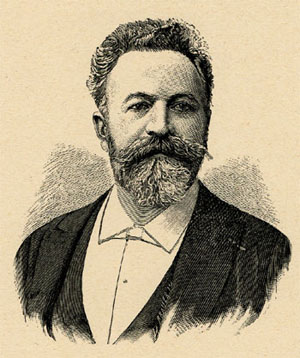
This engraving shows Colonne in the early 1890s.
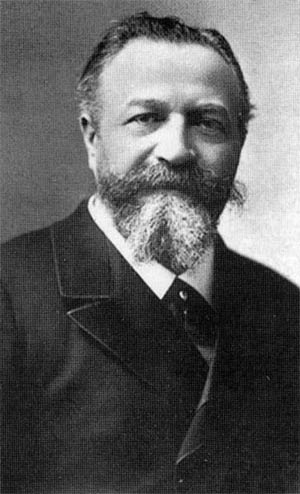
This photo shows Colonne in the late 19th century (probably the 1890s)
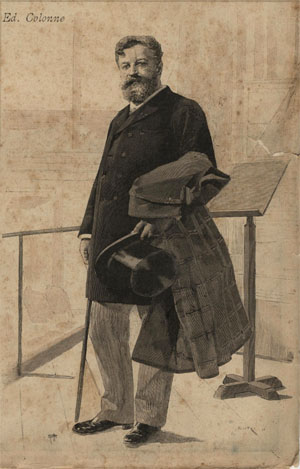
The above photo was published on the front page of La Revue Illustrée 15 June 1891, no. 133
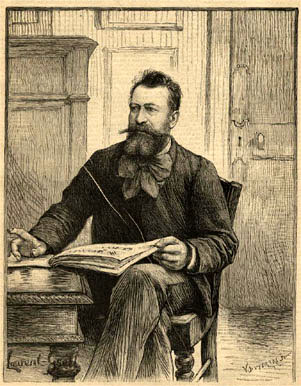
The above engraving was published on the front page of La Vie Populaire, 13 December 1891.
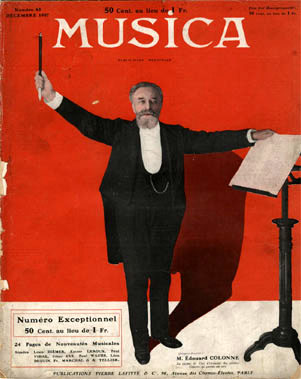
This issue of the monthly journal Musica (no. 63) was published in December 1907.
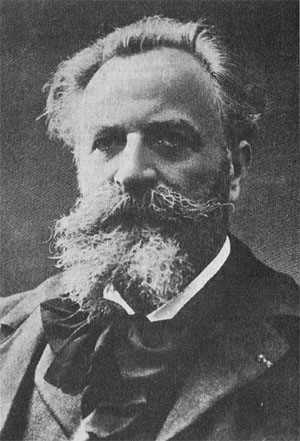
This photo is from The New Grove Dictionary of Music and Musicians, 1980, vol. 4, page 583.
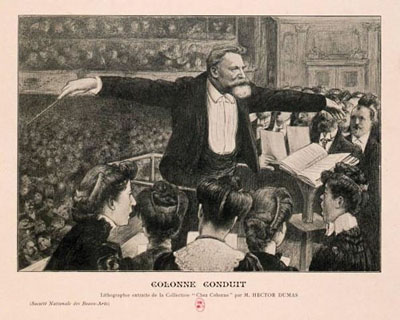
This lithograph, entitled “Colonne Conducts”, is by Hector Dumas; it is reproduced here courtesy of the Bibliothèque Nationale de France.
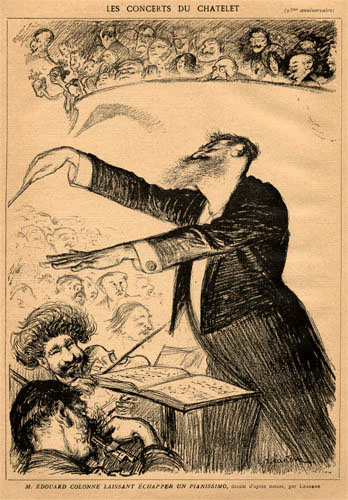
The above drawing by Léandre appeared in Les Annales on 23 October 1898. The caption reads: M. ÉDOUARD COLONNE LAISSANT ÉCHAPPER UN PIANISSIMO [M. Édouard Colonne releases a pianissimo].
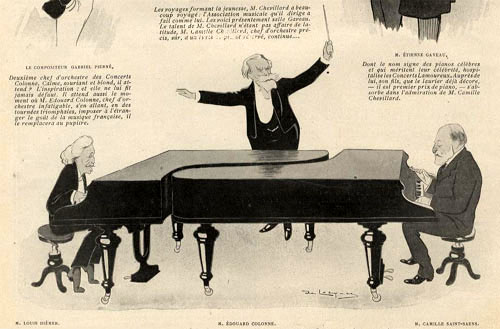
The above cartoon, with the title “ Les Concerts sont ouverts ! ” [the concert season is open!], appeared on page 181 of the journal Musica of December 1907 (see above). ‘Camille Saint-Saëns performed — with M Louis Diémer as his partner — his scintillating scherzo for two pianos. Before and after Messrs Saint-Saëns, again, and Edouard Colonne took turns to conduct the orchestra.’ Note that in this cartoon Colonne is incorrectly shown as holding his baton in his left hand (compare the other pictures above and below).
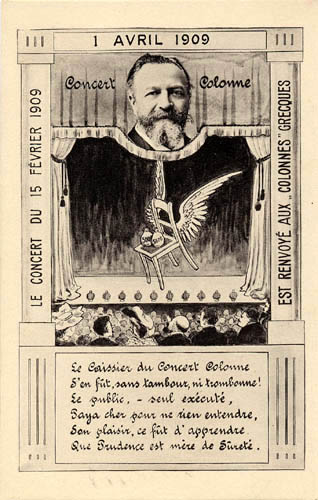
The above postcard, which probably reproduces a newspaper or
a journal, dates presumably from Colonne’s lifetime. The concert which is
alluded to took place on 14 (not 15) February 1909; it was not cancelled but took
place under the direction of Gabriel Pierné.
The caption vertically on the right and left involves a pun with Colonne’s
name on the phrase ‘renvoyer aux Calendes grecques’, which is the equivalent
of ‘postponing indefinitely’.
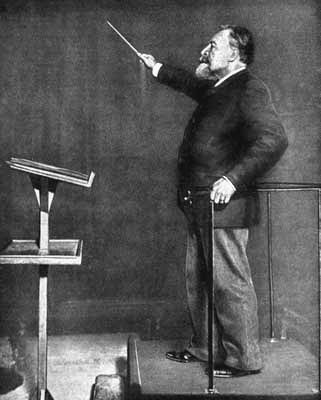
The above photo was published in L’Illustration of 26 November 1938 (page 423) as part of an article to mark the centenary of Colonne’s birth. The photo shows Colonne during one of the last rehearsals that he conducted.
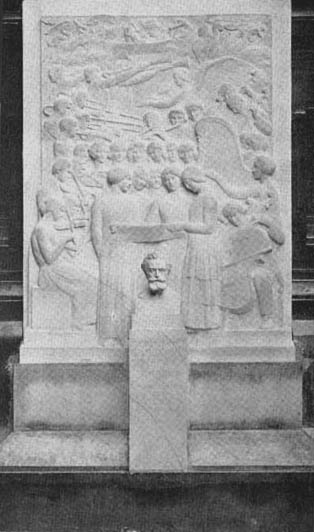
This monument was made and dedicated to Colonne by the sculptor Paul Landowski, and was initially installed in Place du Trocadéro in November 1918. It was moved to a hall in the Théâtre de Chaillot in 1927. We have not been able to establish if the monument is still in the Théâtre de Chaillot.
The dedication on the stand below the bust reads: A/ EDOUARD/ COLONNE/ 1838-1910/ FONDATEUR/ DE / L’ASSOCIATION/ DES/ CONCERTS/ COLONNE
The above picture was published in L’Illustration of 26 November 1938 (page 423).
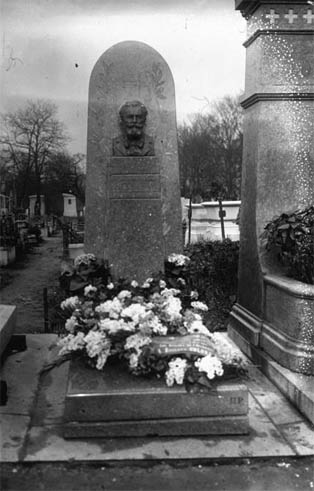
The above photo, taken in 1923, is courtesy of the Bibliothèque Nationale de France. The inauguration of Colonne’s tomb took place on 28 March 1911, as reported in Le Ménestrel. The tomb is located at the northern (topmost) end of the cemetery, and lies in Division 89, along Avenue Carette which separates Division 89 on the left from Division 93 on the right.
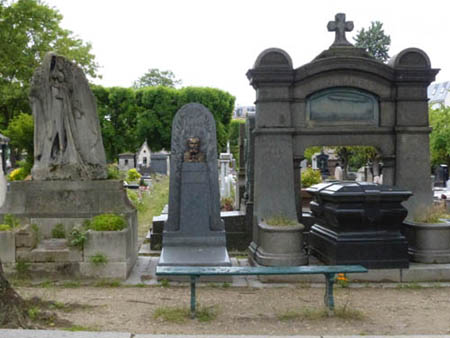
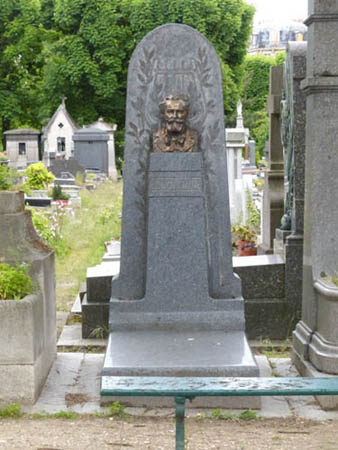
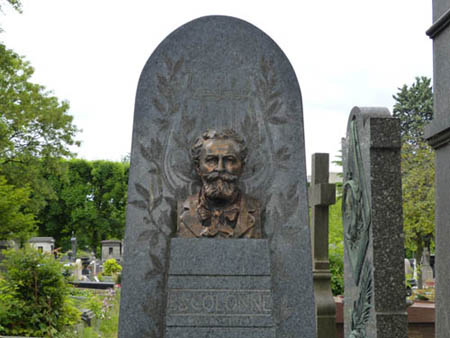
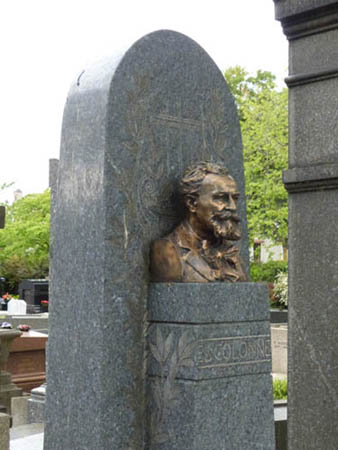
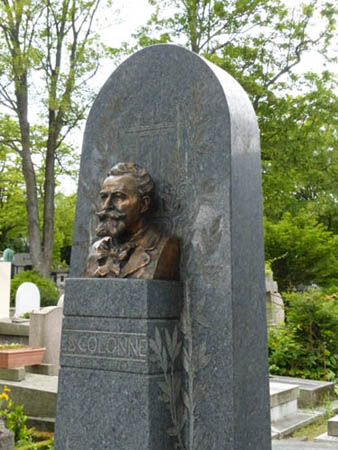
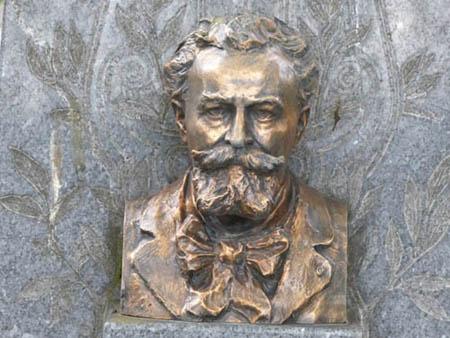
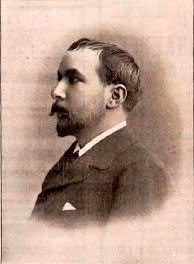
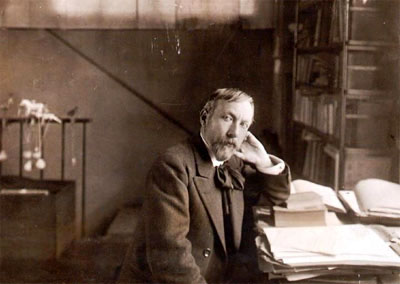
The above two pictures are courtesy of the Bibliothèque Nationale de France.
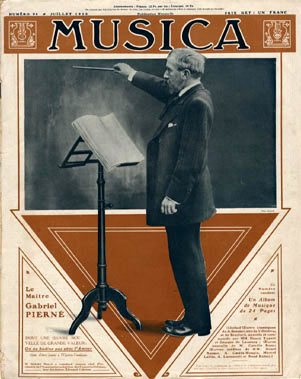
This issue of Musica (no. 94) was published in July 1910.
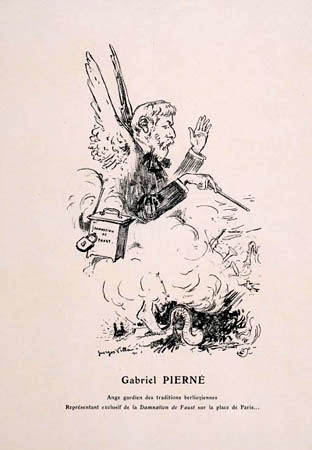
The above cartoon is courtesy of the Bibliothèque Nationale de France.
The caption in the above cartoon reads:
Ange guardien des traditions berlioziennes [Guardian angel of Berliozian
traditions]
Représentant exclusif de la Damnation de Faust sur la place de Paris...
[Exclusive representative of la Damnation de Faust in the Paris
arena]
The original copies of the programmes in this section are in the Hector Berlioz Museum, which possesses a large collection of concert programmes. We are most grateful to the Museum for granting us permission to reproduce the following scanned copies on this page. All rights of reproduction reserved.
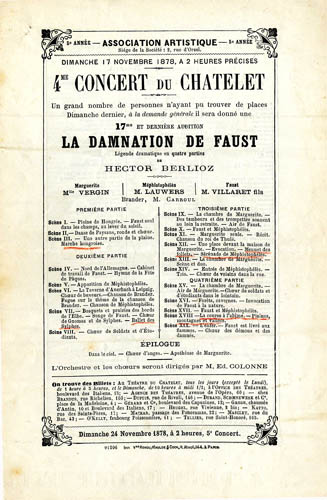
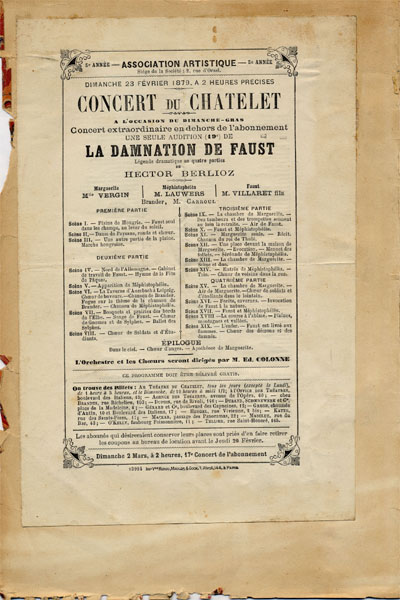
The above programme had been pasted, by a previous owner, on the inside blank cover page of a copy of the 1880 edition of La Damnation de Faust (vocal score), now in our own collection.
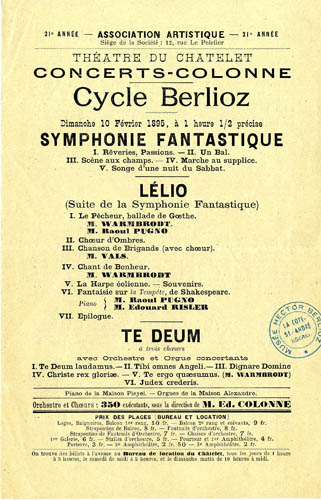
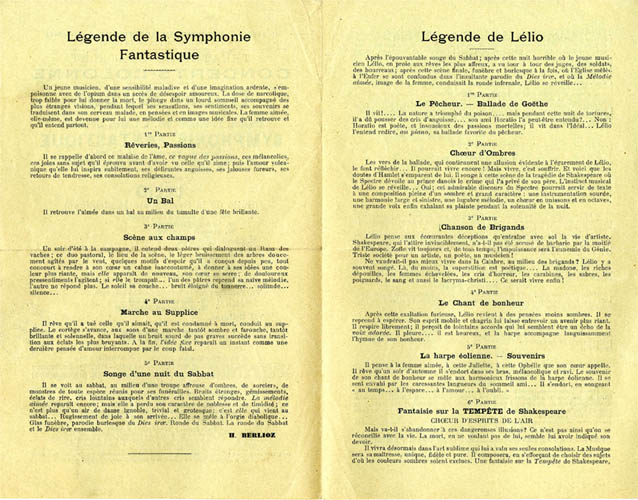
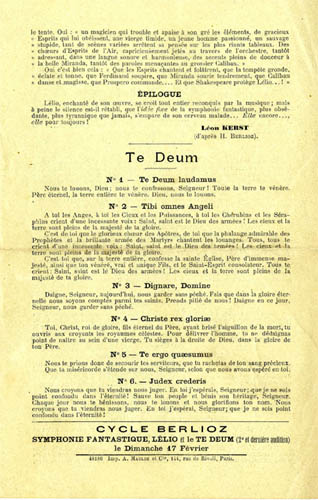
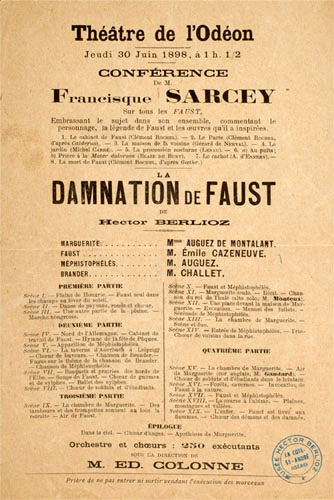
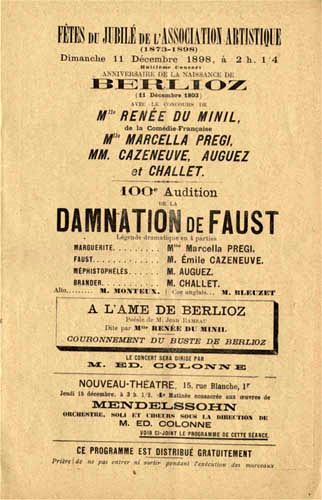
Note the name of the solo viola: Pierre Monteux, who later turned to conducting, was for a decade and a half leader of the viola section of the Colonne Orchestra and played many works of Berlioz under Colonne’s direction (see the reviews of 5 January 1907, 4 April 1908, and 23 October 1909, and the programme below).
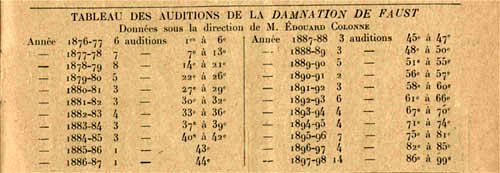
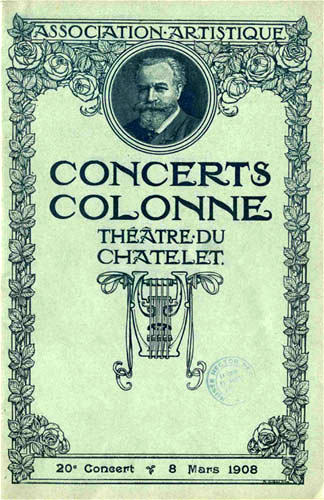
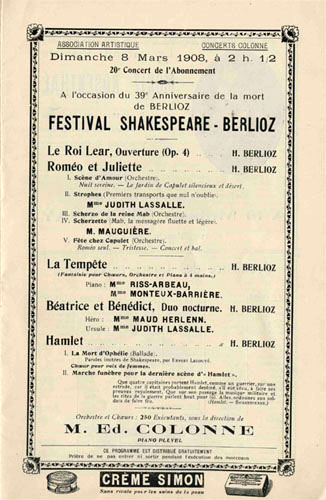
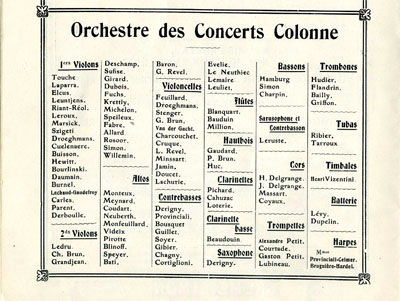
The total number of players is 105; compare the figures for the Lamoureux orchestra, which had larger wind and brass sections.
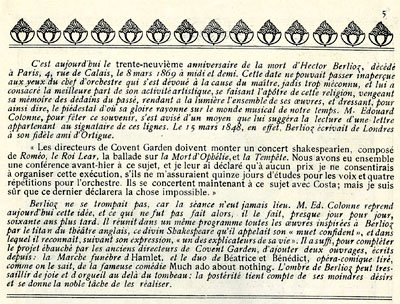
The original copies of the programmes in this section are in our own collection. All rights of reproduction reserved.
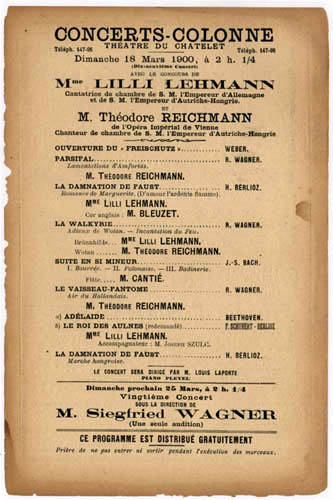
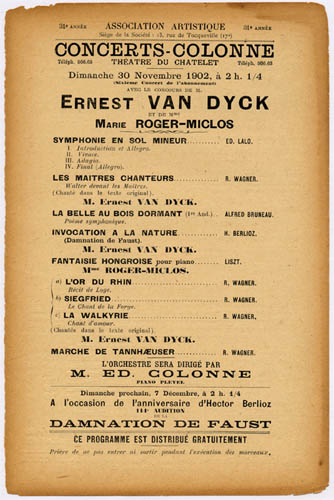
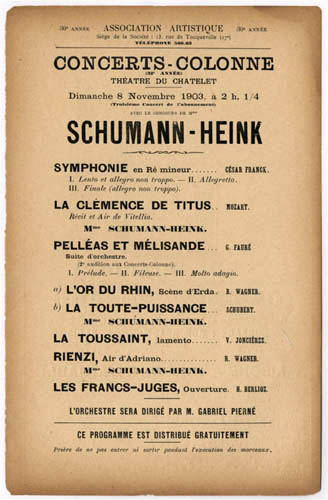
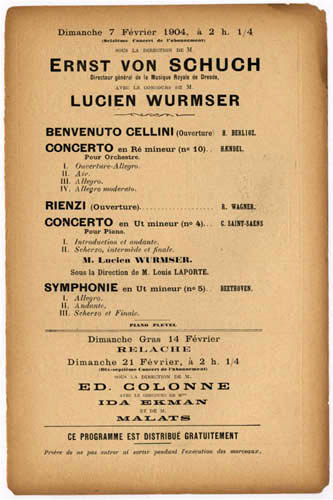
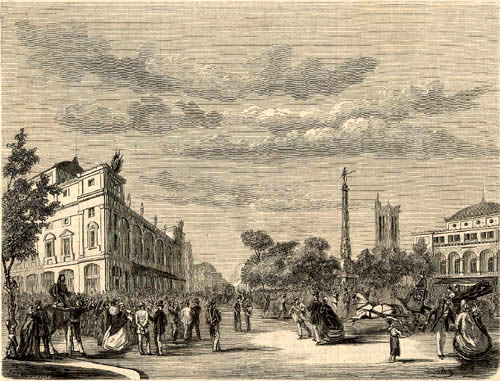
The above engraving, published on the front page of L’Univers Illustré of 28 August 1862, shows the inauguration of the new Théâtre du Cirque-Impérial, which had taken place a week earlier on 19th August. The inaugural performance was given in the presence of Empress Eugénie.
The first concert at the Châtelet of the Concert national (later reconstituted as the Association artistique des Concerts Colonne) took place on 9 November 1873.
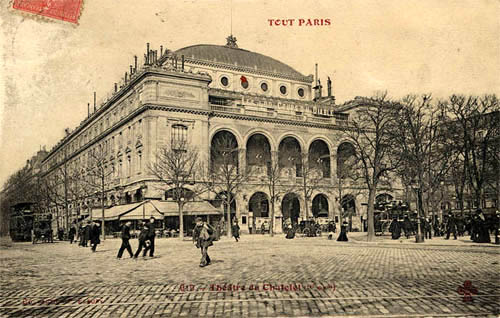
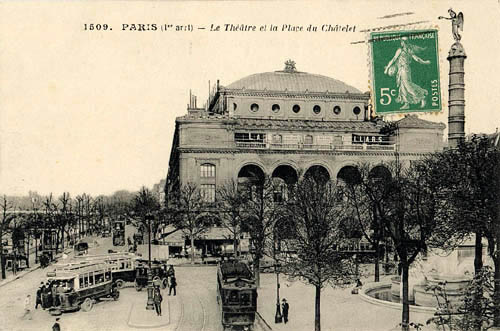

In the above postcard, Théâtre du Châtelet is on the left of the picture; facing it on the other side of the Place du Châtelet is the Theatre Lyrique (now renamed Théâtre de la Ville), where Les Troyens à Carthage was premiered in November 1863.

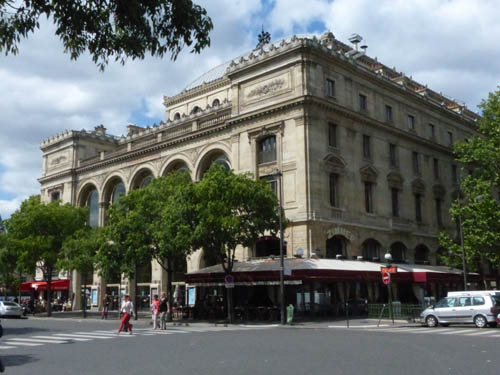
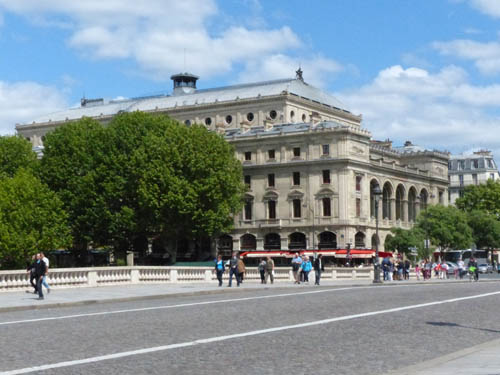
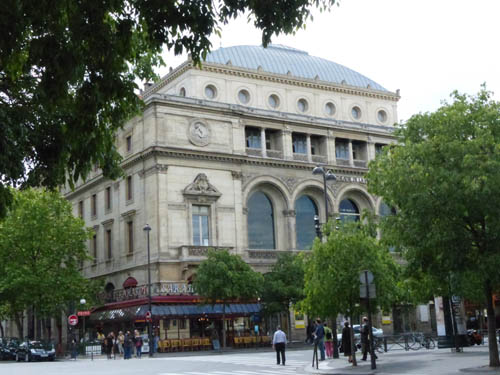
The Palais du Trocadéro was built to house the Exposition Universelle of 1878 and 1889. It was demolished when the Palais de Chaillot was built to house the Exposition Internationale des arts et techniques of 1937.
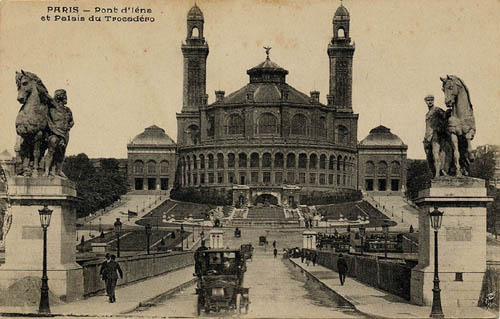
The Concerts Colonne performed occasionally in other locations in Paris apart from the Théâtre du Châtelet, notably the Eden Théâtre, the Château d’Eau, the Nouveau-Théâtre (now renamed Théâtre de Paris), the Tuileries Gardens, the Jardin du Luxembourg, the Théâtre de l’Odéon, and Cirque d’Hiver (formerly Cirque Napoléon).
![]()
The Hector Berlioz Website was created by Monir
Tayeb and Michel Austin on 18 July 1997;
Page Berlioz: Pioneers and
Champions created on 15 March 2012; this page created on 1 March 2013,
enlarged on 1 April, 1 May and 1 August 2013; 1 May 2020.
© Monir Tayeb and Michel Austin. All rights reserved.